American Samoa is a grouping of several small islands that are located in the South Pacific. For visitors, the National Park of the American Samoa is the main attraction, but there is a long list of things to do outside of the national park. In this guide, we cover the best things to do in American Samoa, plus tips to help you have the best experience.
We spent three days in American Samoa in May 2023. Tim, Tyler, and I first visited Samoa, which sits just 130 kilometers (80 miles) west of American Samoa. From Samoa, we flew across the International Date Line, spent three days on Tutuila, and then continued home. In total, we spent about one week on these two islands.
The main purpose for our visit was to explore the National Park of American Samoa since we have the goal of visiting all of the US National Parks. But we also thoroughly explored the island of Tutuila, the largest island in American Samoa, and share what we learned in this guide.
When planning a trip to American Samoa, you have the option to extend your trip, also visiting Samoa, Hawaii (flights from the US to American Samoa go through Honolulu so it is easy to add some time in Hawaii), Tonga, and Fiji. We’ll go into this in more detail, as well.
During our visit, tourism was still recovering after the pandemic. From the US, there were just 2 flights a week from the USA to American Samoa and 2 flights a week to and from the Manu’a Islands from Tutuila, so this had a big impact on our timing. We did not visit the Manu’a Islands, because it would have added a week onto our trip and we did not have that kind of time.
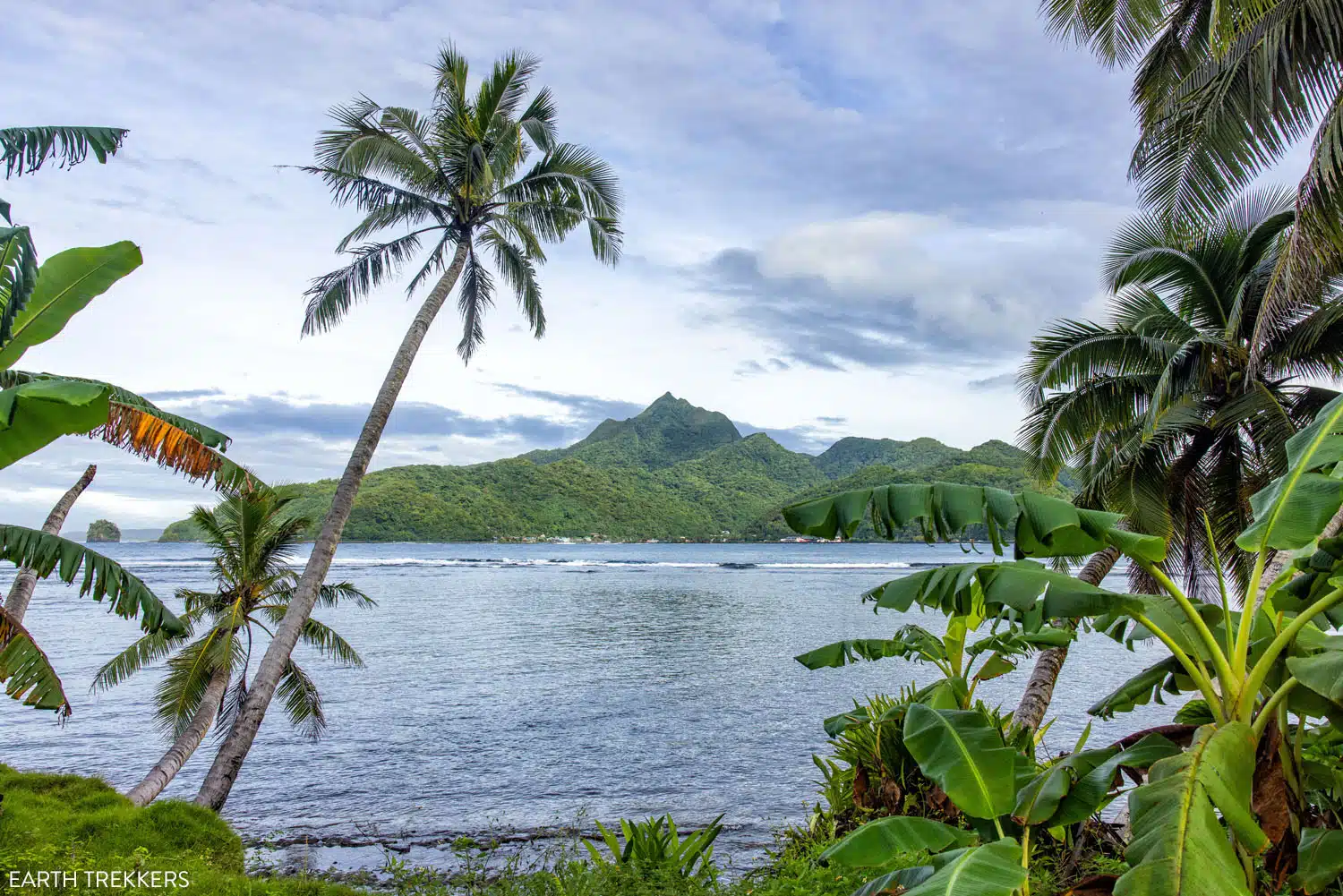
American Samoa
Interesting Facts about American Samoa
American Samoa (Amerika Sāmoa in Samoan) is an unincorporated territory of the United States. This is the southernmost territory of the United States and one of two territories that sit south of the equator (the other is Jarvis Island, which is uninhabited). It also sits just to the east of the International Date Line.
American Samoa is made up of five islands and two coral atolls.
Tutuila is the largest island, the location of the international airport, and the point where you will enter and exit American Samoa.
The Manu’a Islands are a group of three small islands, Ofu, Ta’u, and Olosega. These very remote islands contain one of the most pristine beaches in the world, Ofu Beach.
The Rose Atoll and Swain Islands are also part of American Samoa.
The National Marine Sanctuary of American Samoa is one of the largest marine sanctuaries in the USA. This sanctuary is located around the islands of American Samoa and includes the Rose Atoll.
American Samoa is home to 45,000 people, mostly indigenous Samoans. Most people can speak Samoan and English fluently. The Samoan islands are home to the oldest Polynesian culture. 3,000 years ago, the first people from Southeast Asia traveled to and populated these islands.
The United States has had a presence here since the 1800’s and American Samoa became a major naval outpost. In 1967, American Samoa became self-governing.
Tuna is the main export (as you drive through Pago Pago you will pass by tuna processing plants, including Starkist) and tourism makes up a small amount of the economy. Due to its remote location and limited number of flights per week, these islands get very few tourists.
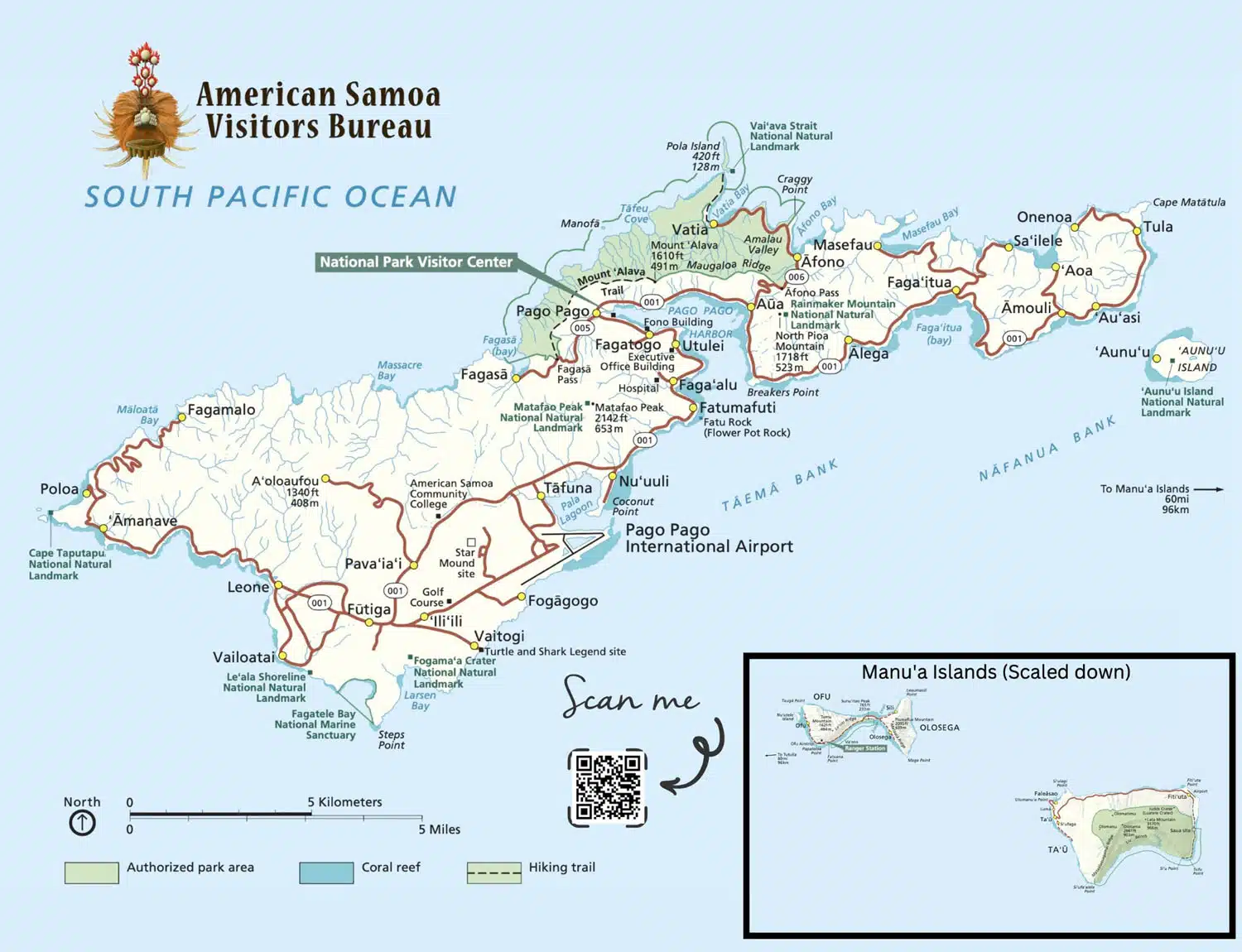
Map of the American Samoa from the American Samoa Visitors Bureau.
How Do You Get to American Samoa?
There are two ways to get to American Samoa: on a cruise and by plane.
Flights to American Samoa enter Pago Pago International Airport on Tutuila. How you get to Pago Pago depends on your starting point.
All of the details below are from our research for our trip in 2023 and then updated in 2024. There is a chance that more flights could become available in the future.
From the United States
From the United States, flights currently go through Honolulu, Hawaii. Flights are offered by Hawaiian Airlines two to three times a week, usually on Monday, Tuesday and Thursday.
From Samoa
Talofa Airways offers flights from Samoa to American Samoa. This flight takes 30 minutes, crosses the International Date Line, and carries 8 passengers.
CROSSING THE INTERNATIONAL DATE LINE: We first visited Samoa (Tim, Tyler, and I visited New Zealand and Australia before our trip to American Samoa) for a few days. On Wednesday, May 17 at 10:00 am, our flight left Apia, Samoa. We crossed the International Date Line and landed at Pago Pago International Airport on Tuesday, May 16 at 10:30 am. Talk about traveling back in time!!
From Australia, New Zealand & Fiji
From Australia, New Zealand, and Fiji, you will first fly to Apia, Samoa or Tonga and then fly to American Samoa. There are no direct flights from Australia and New Zealand to American Samoa at the time that I am writing this guide.
GETTING TO AMERICAN SAMOA: So, to get to American Samoa, you will either fly through Hawaii, Tonga, or Samoa. Which one you travel through depends on your starting point.
Best Things to Do in American Samoa
In no particular order, here is a list of the best things to do in American Samoa. Everything listed is located on Tutuila Island unless otherwise noted.
1. Visit the National Park of American Samoa
Without a doubt, visiting the National Park of American Samoa is one of the best things to do in American Samoa. If you are like us, this is the main reason you are planning a trip here.
The National Park of American Samoa is spread across three islands: Tutuila, Ofu, and Ta’u. Tutuila is the easiest of these islands to visit. Ofu and Ta’u, which are part of the Manu’a Islands group, is much more remote. Flights to the Manu’a Islands currently only run two days a week.
Below we list the best things to do in the National Park of American Samoa. In our guide to the National Park of American Samoa, you can read the full list of things to do in the park, with important planning information about each of these sights.
- Pola Island and Vai’ava Strait Viewpoint
- Hike the Pola Island Trail
- Hike the Lower Sauma Ridge Trail
- Hike the Mount ‘Alava Adventure Trail
- Visit Ofu Beach
- Hike the Tumu Mountain Trail
National Park of American Samoa: Things To Do, Photos & Map
Things to do in the national park plus lots of helpful information to have the best experience.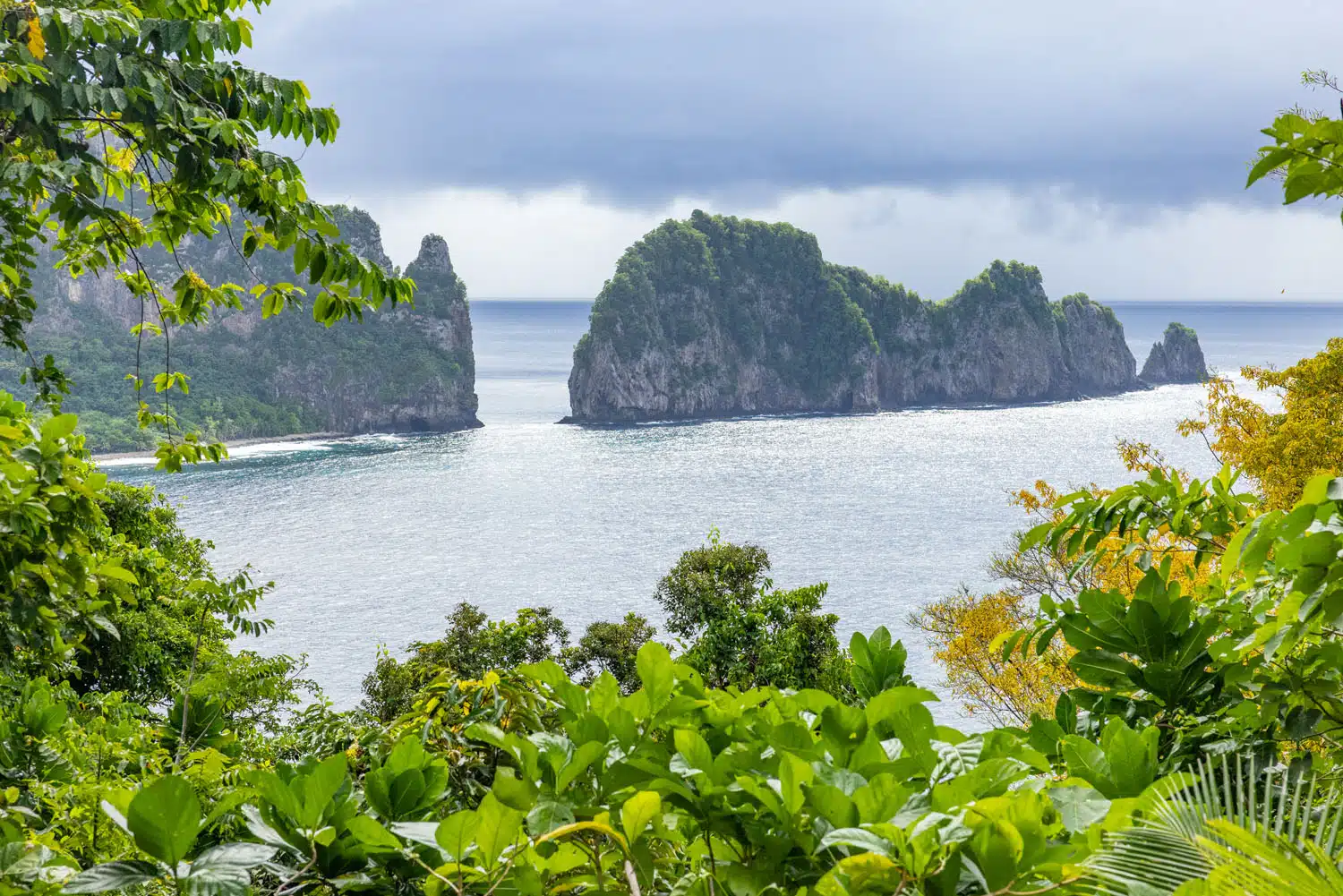
Pola Island Viewpoint
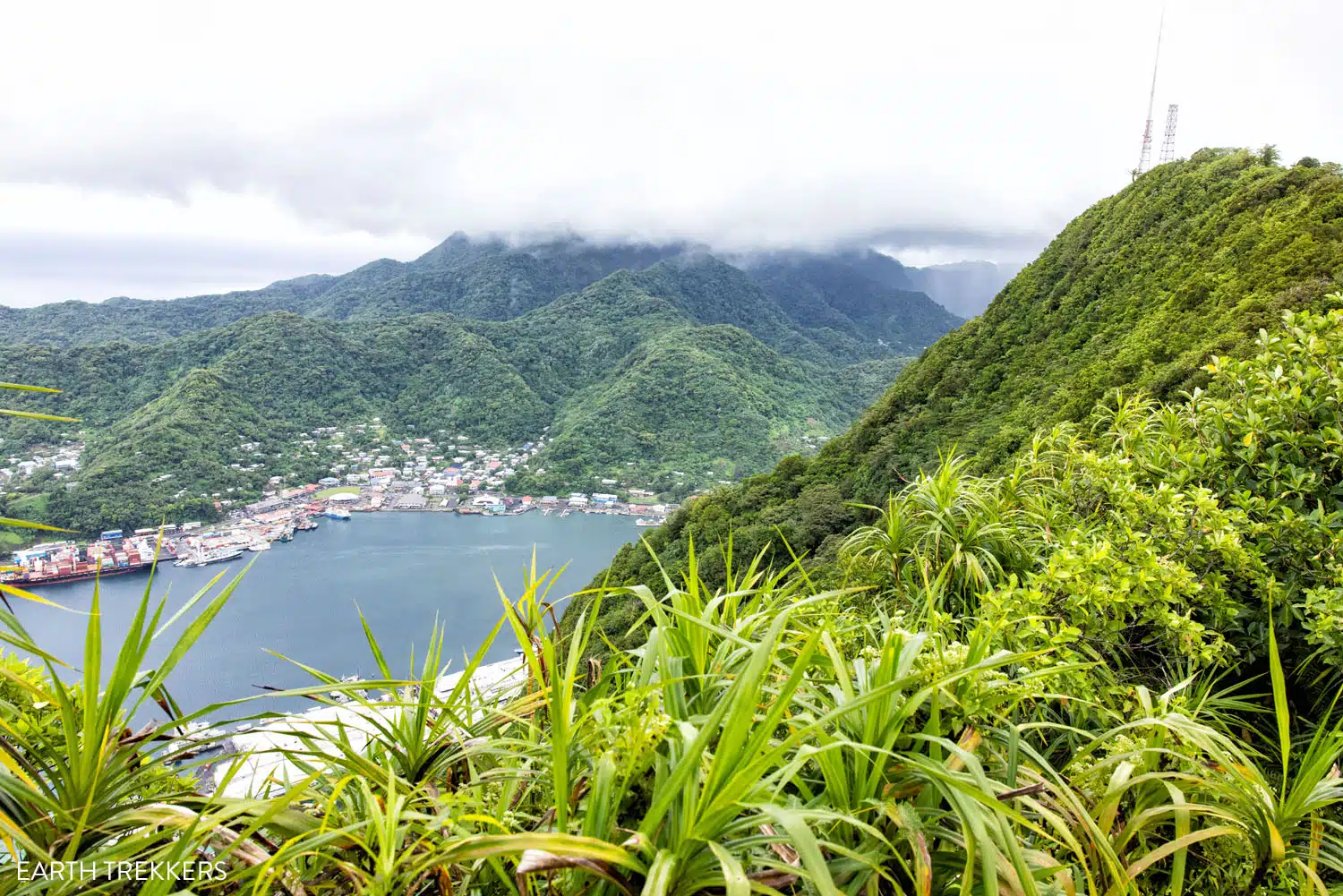
View from the Mount ‘Alava Adventure Trail
2. Spend Some Time in Pago Pago
Pago Pago is the large, protected harbor in Tutuila. Route 001 runs along the harbor and on this drive, there are a few places to visit.
The Visitor Center for National Park of American Samoa
This is a good place to start your visit to the national park, to pick up a park map and ask any questions you may have about the park.
Sadies By The Bay
This is one of the best places to eat in American Samoa. We had dinner here two nights in a row and highly recommend it. It can be a bit of a drive to get here from the Tradewinds Hotel (the best place to stay on the island). Even though it is only 9 miles from the hotel, with a speed limit of 20 to 25 mph, it takes almost 30 minutes to drive here.
PRO TRAVEL TIP: On most of Tutuila, the speed limit is 25 mph (it goes as low a 20 mph around Pago Pago Harbor and near the airport) and it is dutifully obeyed. Be prepared for slow driving speeds and a longer time than you would expect to get around the island. We joked that if we were on bikes we would get around the island faster.
Jean P. Haydon Museum
This small museum was established by Jean P. Haydon in 1970 and contains artifacts over 450 years old plus moon rocks from the US Apollo Space Missions.
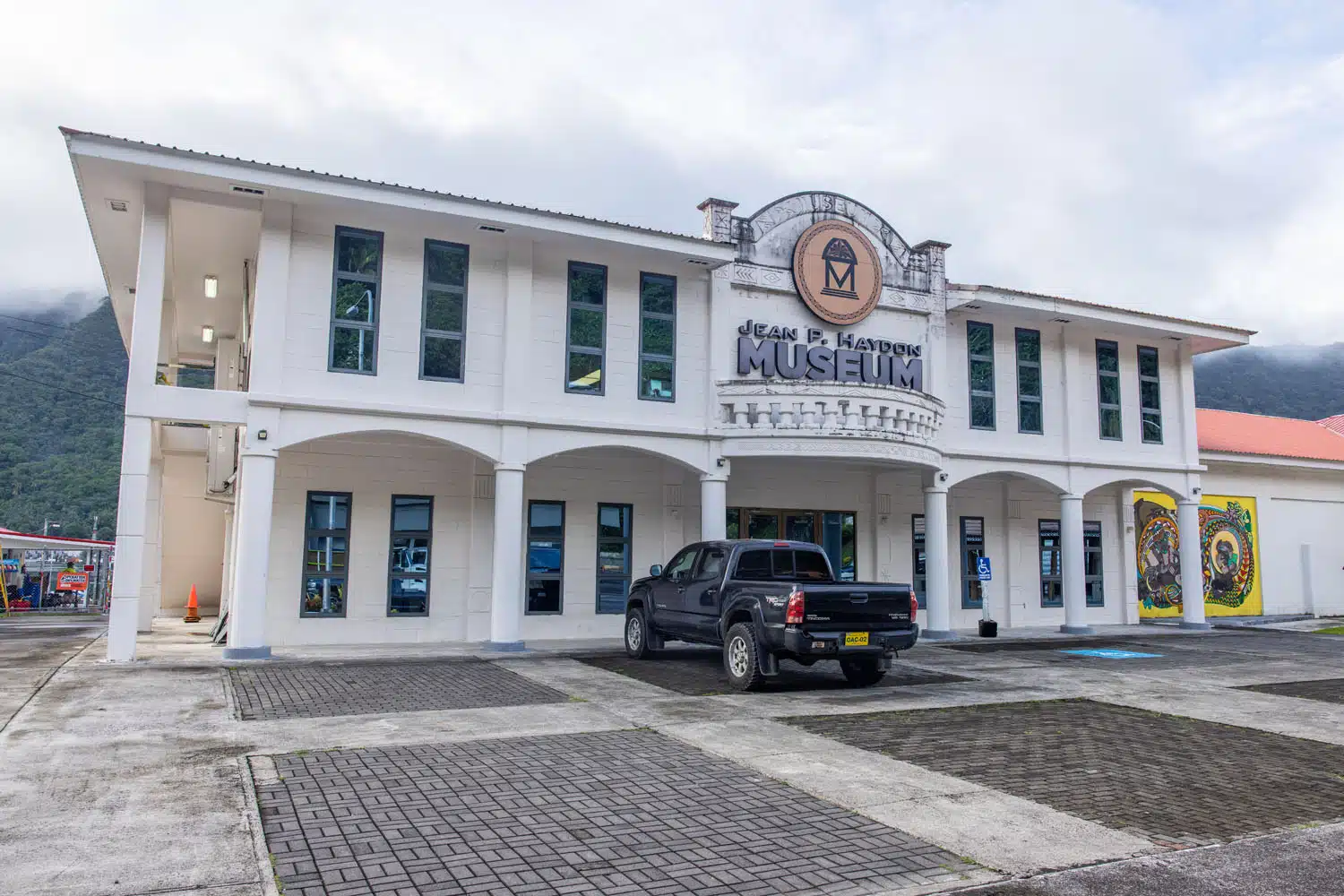
Jean P. Haydon Museum
Tauese P.F. Sunia Ocean Center
This is the visitor center for the National Marine Sanctuary of American Samoa. Get updated hours and learn more about the exhibits on the official website.
The Aerial Tramway
This comes up on a lot of to do lists for American Samoa but it’s not all that exciting, in our opinion. However, there is a very nice view over the Pago Pago Harbor next to the tramway car, mentioned next.
In the 1960’s, a tramway carried people from the harbor to the top of Mount ‘Alava. According to the sign at the tramway site, the tramway was damaged in a 1992 hurricane and never repaired. One of the old tramway cars sits on a hillside overlooking Pago Pago. It’s not listed on Google Maps but here are the GPS coordinates where you can see it: 14°16’41.7″S 170°41’04.9″W (plus it is also marked on our map below).
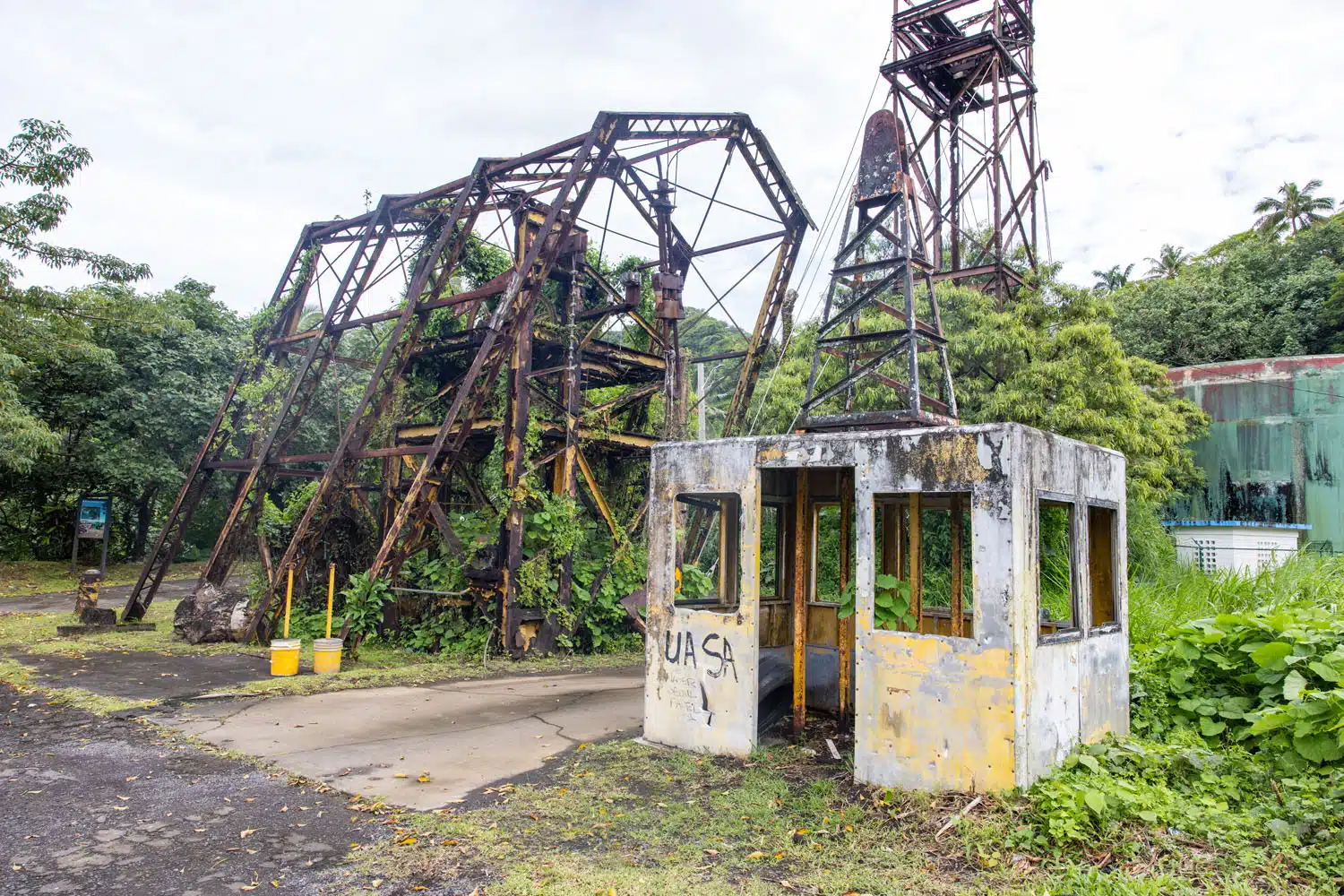
View of Pago Pago Harbor
If you park next to the tramway car, there is a short uphill walk to a pavilion with a view over Pago Pago Harbor. This is one of the easiest aerial views of Pago Pago Harbor that requires little to no hiking. We think the view from here is better than from the Blunts Point Trail.
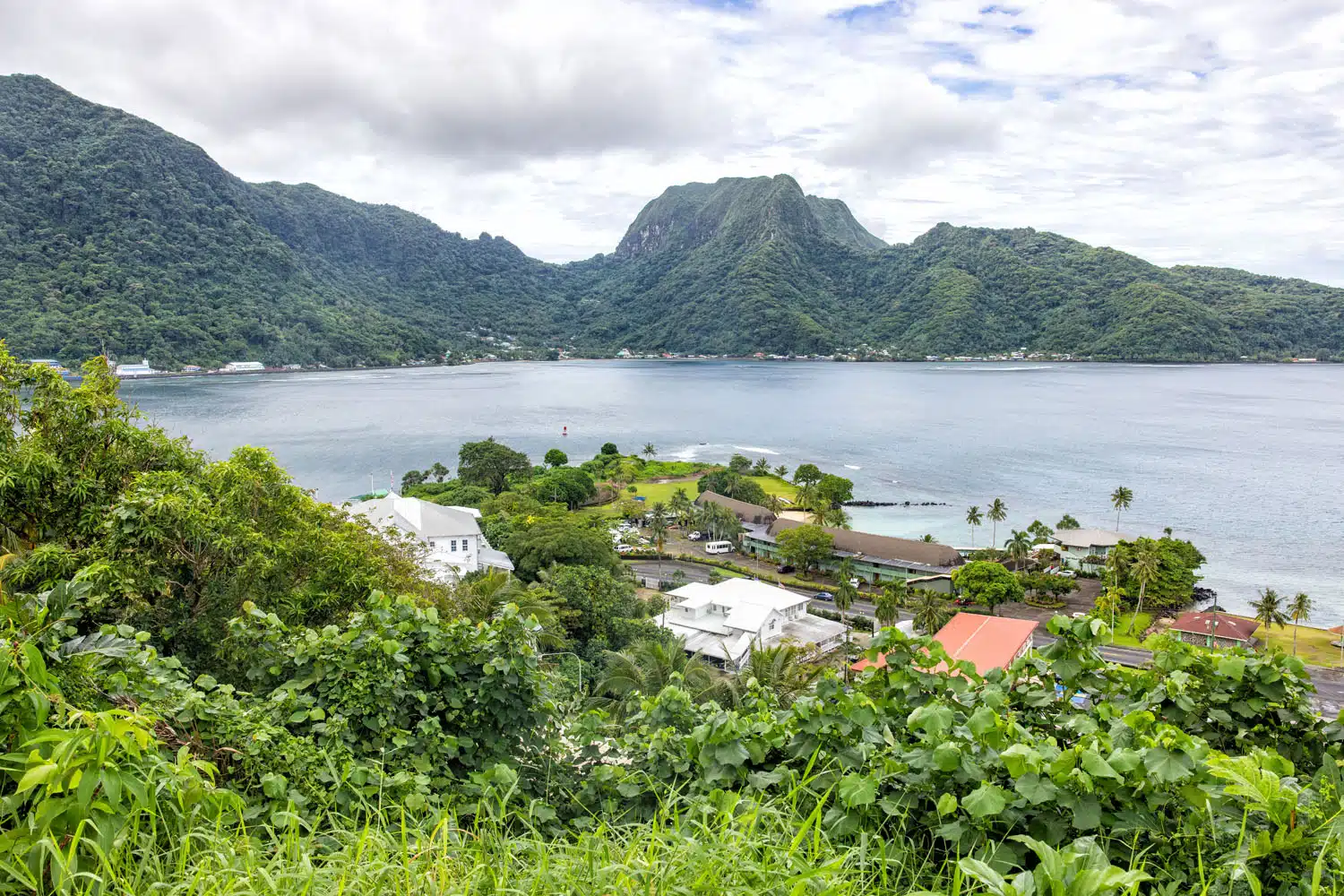
View of Pago Pago Harbor
WWII Heritage Trail
This hike runs from Blunts Point to the tramway car. It runs through a rainforest and takes you past a few WWII installations, but overall it is a slippery trail through a forest.
The best of this trail is Blunts Point and the tramway site (the two end points of this hike) and in our opinion, it’s not worth hiking the WWII Heritage Trail. For the best use of your time, drive to the tramway site for views of Pago Pago Harbor and hike the short trail to Blunts Point.
3. Blunts Point Trail
The Blunts Point Trail is perfect for WWII history buffs. You’ll find several large WWII turrets along viewpoints overlooking Pago Pago harbor.
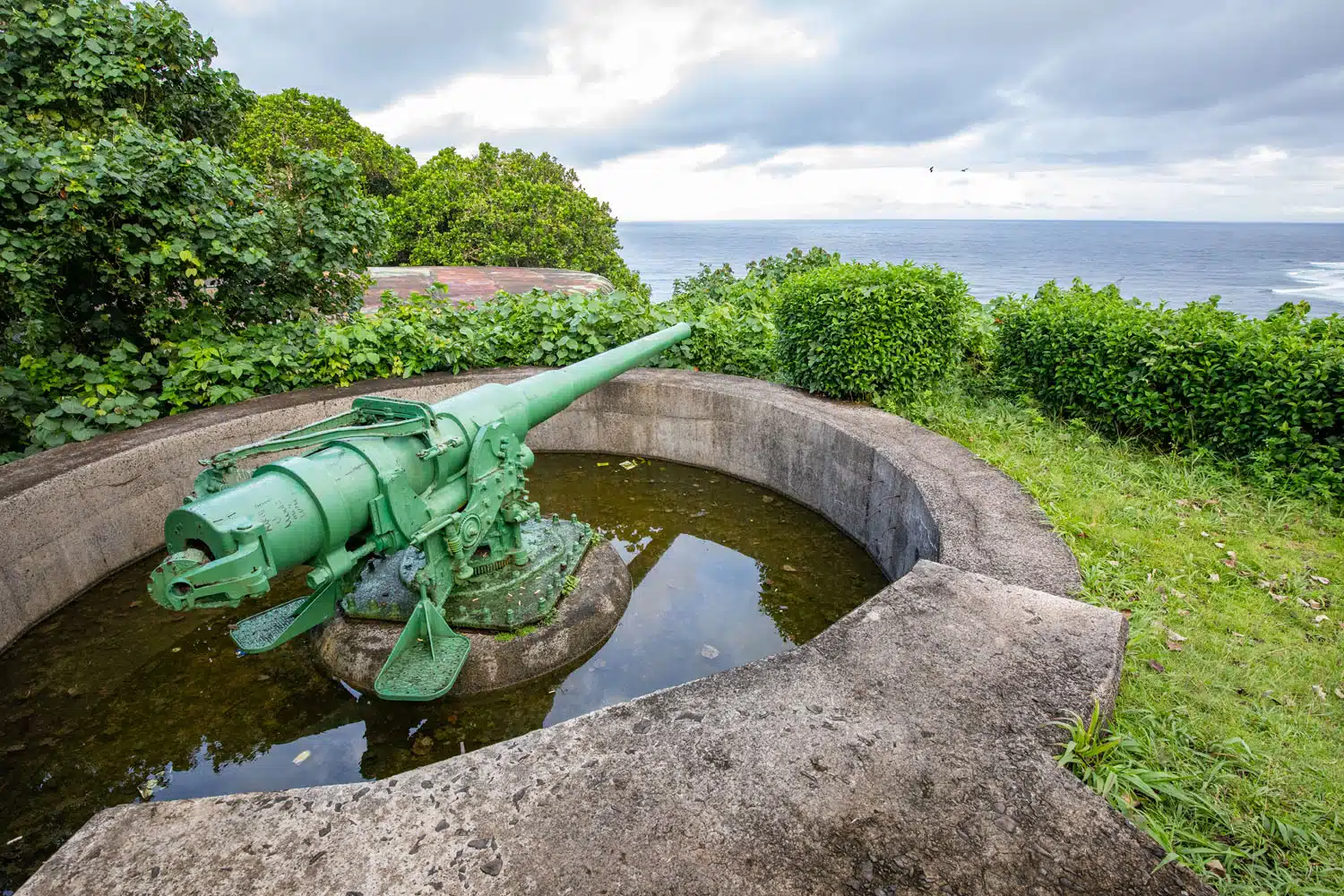
Gun turret on Blunts Point Trail

Blunts Point Trail View
The trail starts on a wide, forested path behind the Fresh Laundromat. A series of gradual switchbacks will take you up to your first viewpoint. From here you get views of the harbor while also having the option to get up close with one of the towering WWII guns. Continuing shortly onwards, you’ll find the second of the two guns a bit higher up.
We did not continue on the WWII Heritage Trail due to time constraints. However, from our research and our own experiences, this hike is only worth it to see a few more WWII artifacts, but from our research, the better views and the better WWII historical sites are located on the Blunts Point Trail.
The Blunts Point Trail itself is a boring, uphill walk through the forest, and the views that come really aren’t great. It’s also a very buggy trail so be prepared to be swatting mosquitos for the entire hike.
4. See a Fruit Bat
Fruit bats, aka flying foxes, live in the rainforest and they can be difficult to spot here. Fortunately, they also nest in a tree that is very easy to get to.
This tree is located very close to the intersection of Route 001 and Route 006, which is on the north side of Pago Pago Harbor.
We parked in a wide, sandy lot on Route 001 (this is marked on our map below and here are the GPS coordinates: 14°16’12.6″S 170°39’57.3″W). The tree is located across the street and to the right and it takes less than a minute to walk here (here are the GPS coordinates of the tree 14°16’13.5″S 170°39’58.9″W and this is also marked on our map below).
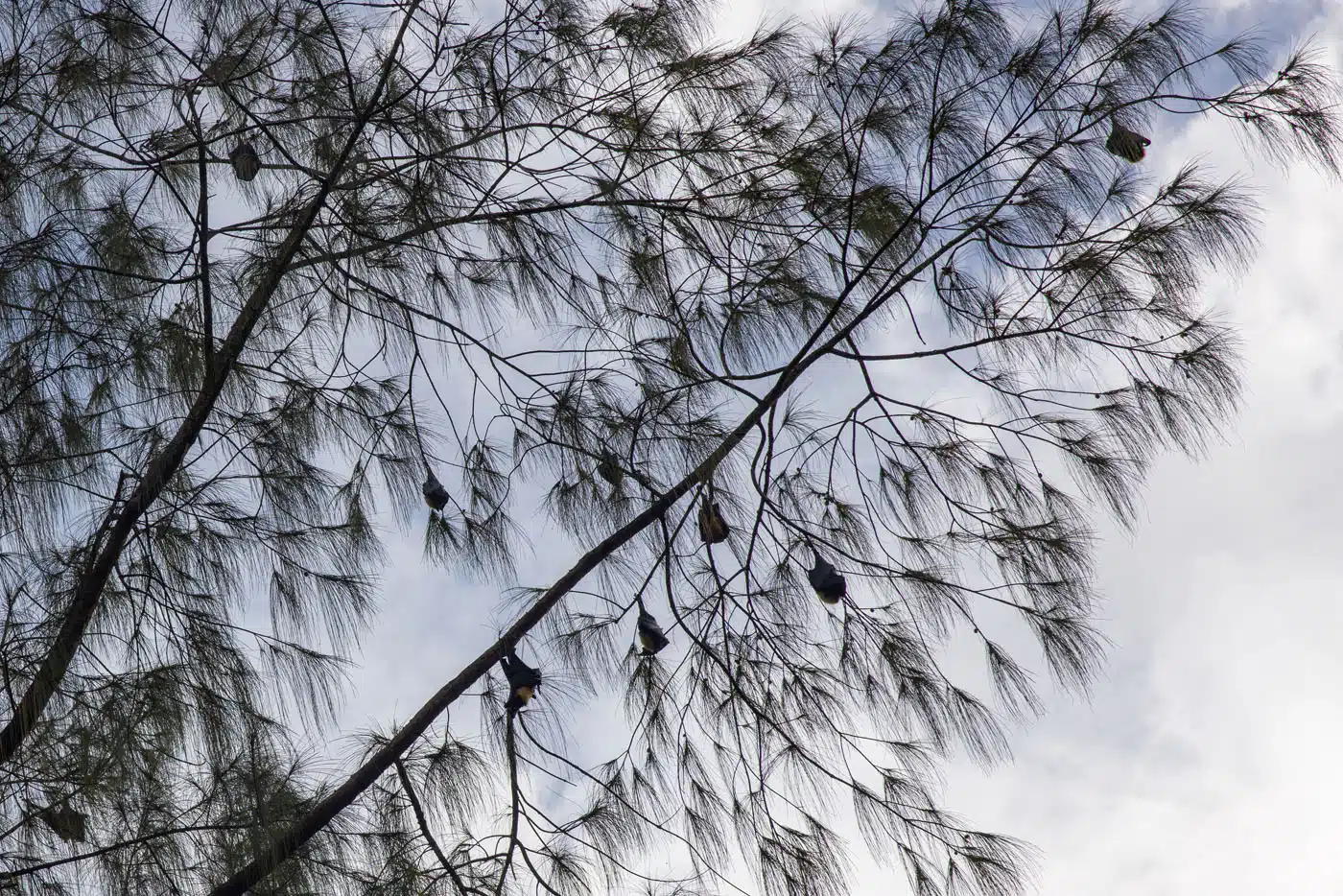
Fruit bats
5. Go Snorkeling at Fatumafuti Beach
Fatumafuti is a small beach with a gorgeous view across the harbor. One of the National Park rangers also told us that this is one of the best places to go snorkeling on Tutuila. There is a parking area next to the beach. It is open from Monday through Saturday 6 am to 6 pm and no swimming is allowed on Sunday.
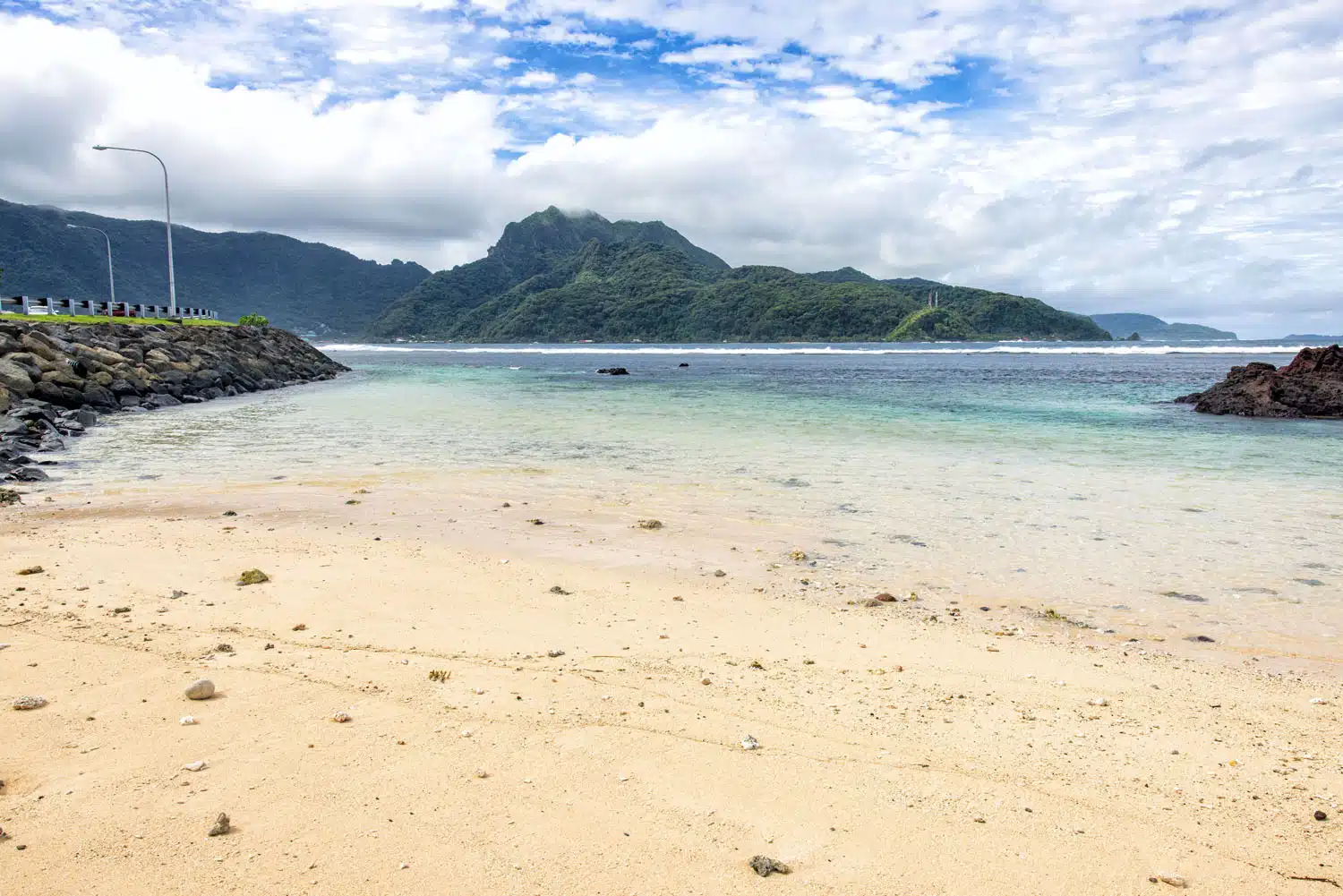
Fatumafuti Beach
6. Learn about Samoan Culture
About 3,000 years ago, the first people from Southeast Asia made it to the Samoan islands. This is the oldest Polynesian culture.
Fa’a Samoa (the Samoan way) is this ancient culture. Family and community values a vital part of the Samoan culture, as is their Christian religion.
You can learn more about the Samoan culture by attending a fiafia night (dinner and dancing hosted by some resorts and hotels), visiting a village, or speaking with the village chief.
The Samoans are very friendly and welcoming but there are some things you should know about the culture before you get to American Samoa.
- The Samoan culture is modest. When you aren’t on a beach or sitting next to a pool, cover up with a T-shirt and a sarong or pants.
- Many beaches are the property of a family or village. You will need to ask permission (and may have to pay a small fee) before visiting the beach. You will also need to ask permission before taking photos.
- If you visit a traditional home or fale, remove your shoes before entering and sit with your legs crossed in front of you.
- If you are asked to share ‘ava, the local drink made from the root of the pepper plant, spill a few drops on the ground or mat in front of you to show respect, raise your cup and say manuia (mahn-We-ah), and have a drink. This is a great honor to be offered this drink.
- Don’t eat or drink anything while walking through a village.
- Sunday is a day of rest so many businesses and restaurants will be closed. You may not be able to access the beaches that are on private land or in the village.
For more information about how to plan your visit to American Samoa, we have a guide that lists 20 important things you should know while planning your trip to American Samoa.
7. Enjoy the View from A’oloaufou
A’oloaufou is a mountain peak on Tutuila. From here, you get an aerial view over the southern part of Tutuila, making this one of the best viewpoints on the island.
To get here, drive up Route 002 towards the village of A’oloau. There will be a hairpin bend in the road just before reaching Maria Le Tina, Aoloau and A’asu Catholic Church. Look for the concrete archways. This is the viewpoint and here is the view:
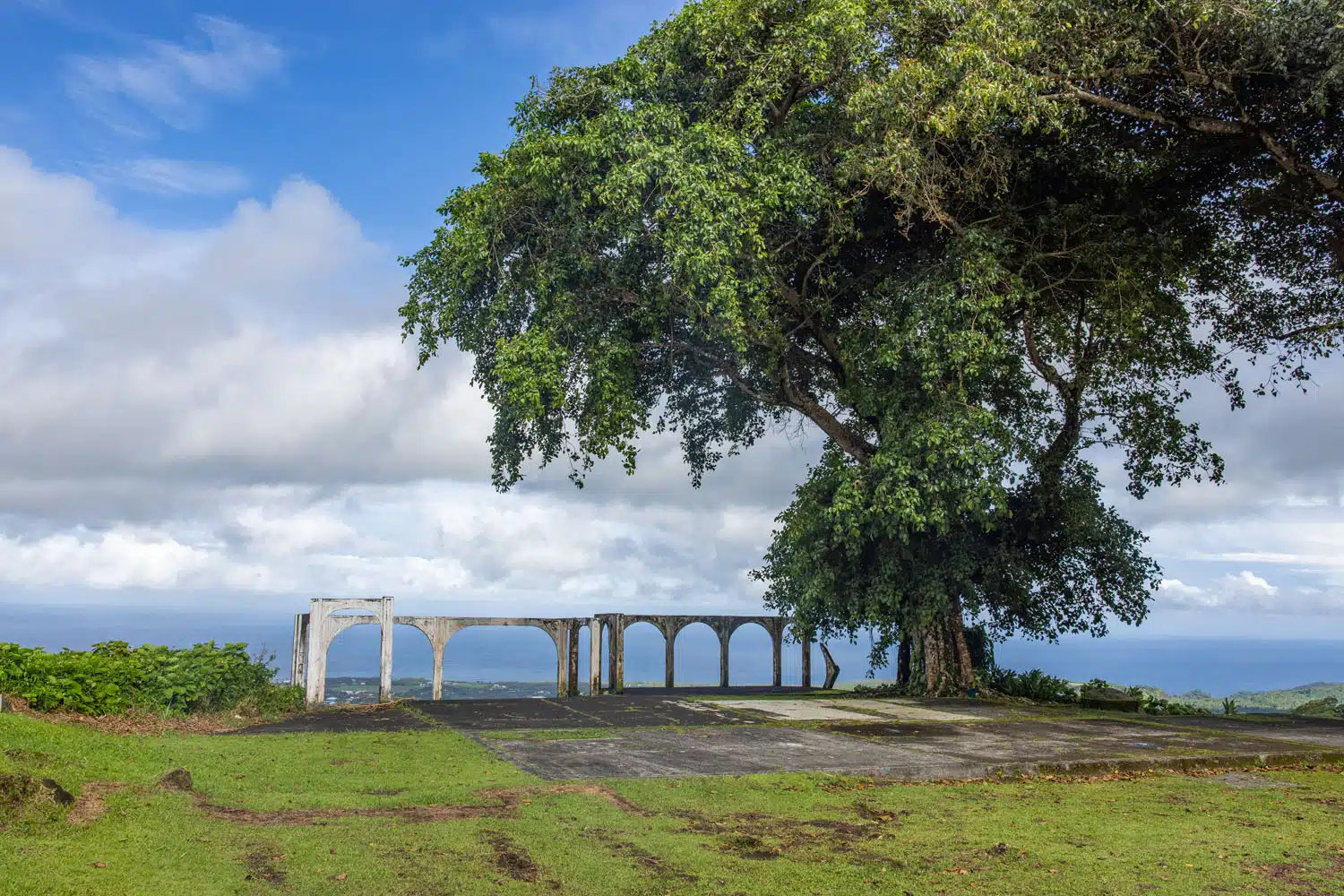
A’oloaufou Viewpoint
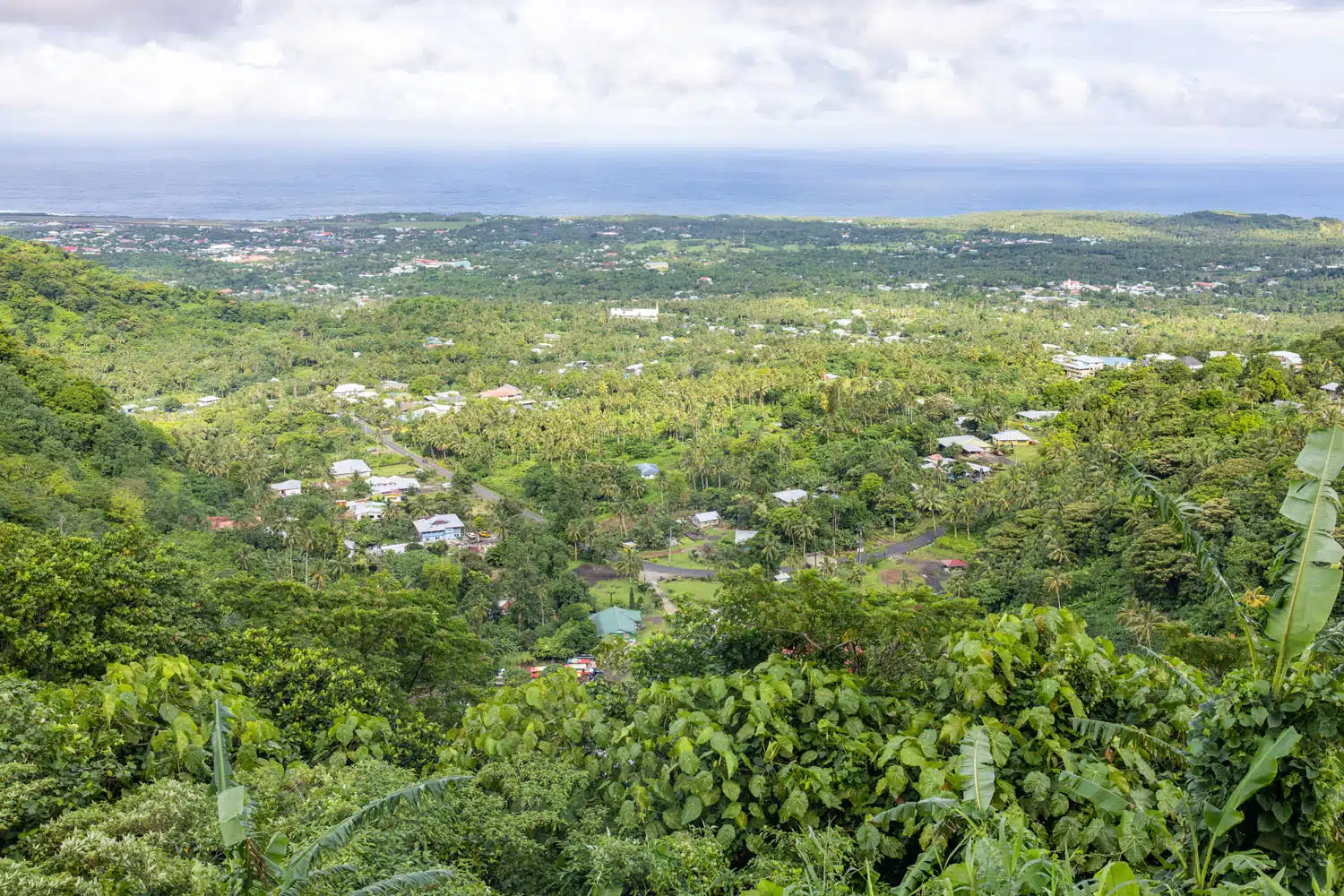
A’oloaufou View
8. Turtle and Shark
Turtle and Shark is a wave pounded coastline of black volcanic rocks and white sandy beaches. The surf here can be intense, as the waves crash against the rocky black cliffs.
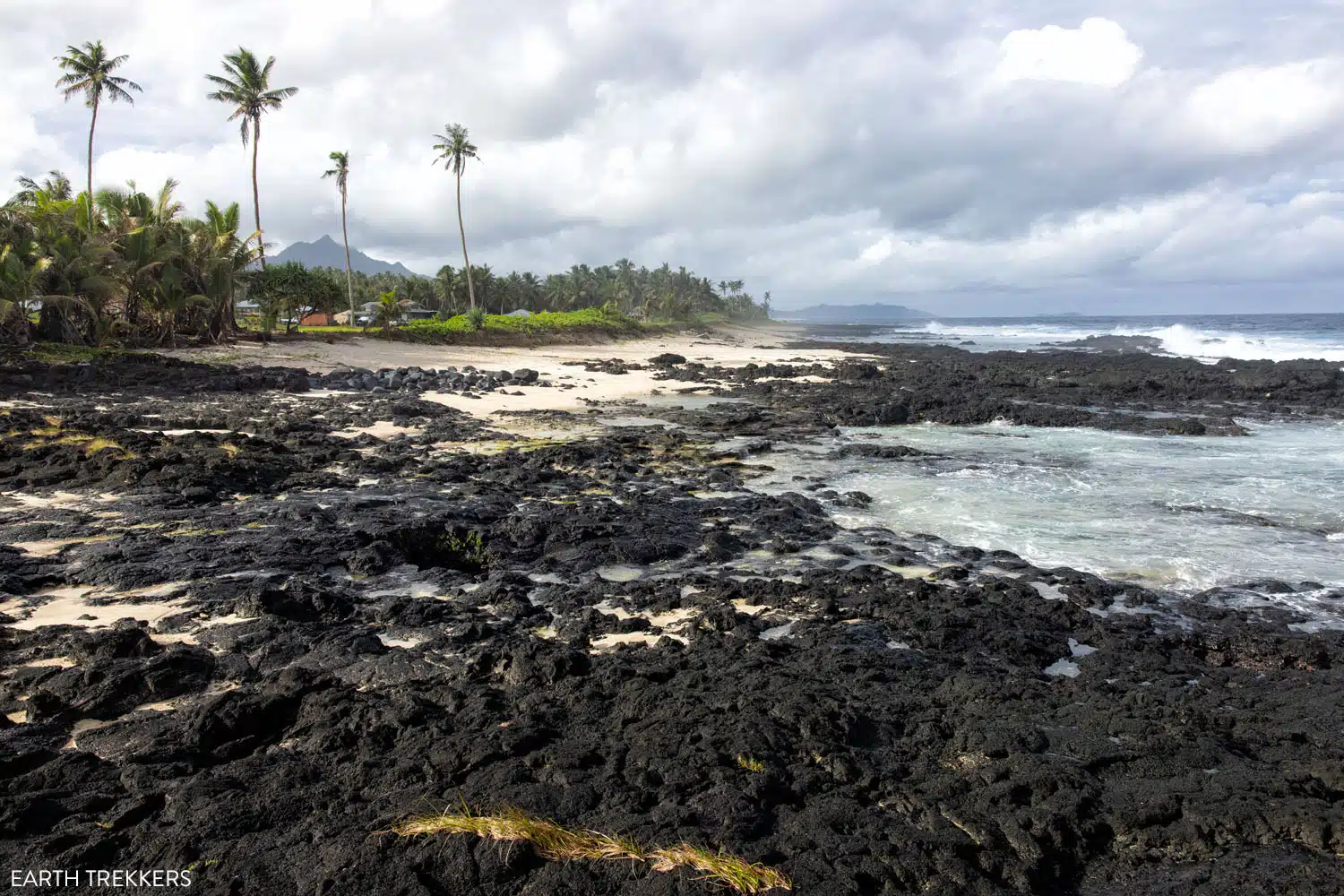
Turtle and Shark
There is a boardwalk overlook of the coastal area, but it was closed for maintenance during our visit. We walked out onto the rocks but you need to be very careful. The rocks are slippery so it is easy to fall. If you get too close to the water’s edge, you risk being pulled out to sea by a rogue wave. And there is a blowhole here so make sure you spot where it is before you step out onto the rocks, and don’t get too close to it. People can be pulled down into blowholes so they can be dangerous.
This spot gets its name from an ancient Samoan legend, which you can read about here.
Turtle and Shark is located on the south side of Tutuila island, west of the airport. We used Google Maps to get here and it is marked on our map. There is parking and Turtle and Shark is free to visit.
9. The National Marine Sanctuary of American Samoa
This is one of the largest marine sanctuaries in the USA. It protects 13,581 square miles of deep-water reefs, hydrothermal vents, coral reefs, and some of the oldest and largest Porites coral heads in the world.
This sanctuary is located around the American Samoa archipelago and includes the Rose Atoll Marine National Monument. There are several protected areas around Tutuila and Ta’u. On southwest coast of Tutuila, the Fagatele Bay Sanctuary Unit and the Fagalua/Fogama’a Sanctuary Unit are the most accessible. Fagatele Bay is listed next.
10. Fagatele Bay
Fagatele Bay is a remote, quiet cove with a small hidden beach. Visitors enjoy the seclusion of this cove, as well as swimming and snorkeling here.
Fagatele Bay was formed by a collapsed volcanic crater, and the bay is now part of the National Marine Sanctuary of American Samoa. Access to the bay is via private property so you do have to pay a fee (cash only) to the property owner, who maintains the trail access to the bay. We were asked to pay $10 USD per person during our visit.
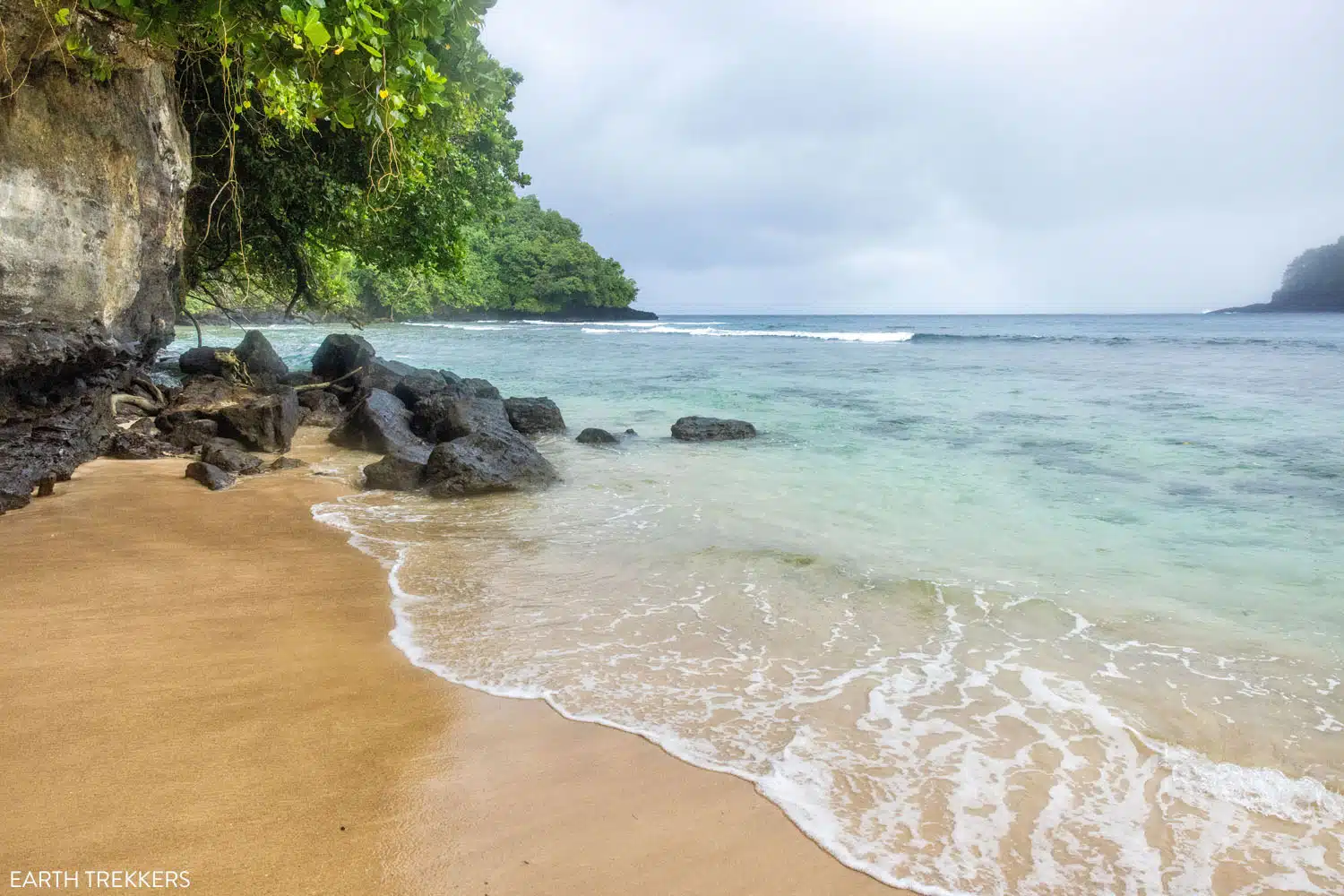
Fagatele Bay
Getting to Fagatele Bay: Take Route 1 (Route 001 on Google Maps) to Futiga Village and turn onto Route 120 (as labeled on Google Maps). You will not see street signs with route numbers or road names at this junction, but there is a street sign indicating the turn for Fagatele Bay. Follow Route 120 to the end. There is a landfill here, as well as some homes. As we drove towards the first visible home, which appeared to be abandoned, the now dirt road split to either side of this house. Drive around to the right side until you reach another home. There will be an intimidating number of “No Trespassing” and “Beware of Dog” signs at the entrance way to this house, but if the gate at this entrance is open then drive on in. This is the property owner that maintains the trail access to Fagatele Bay. Simply pay him in cash and he will point you to the trailhead.
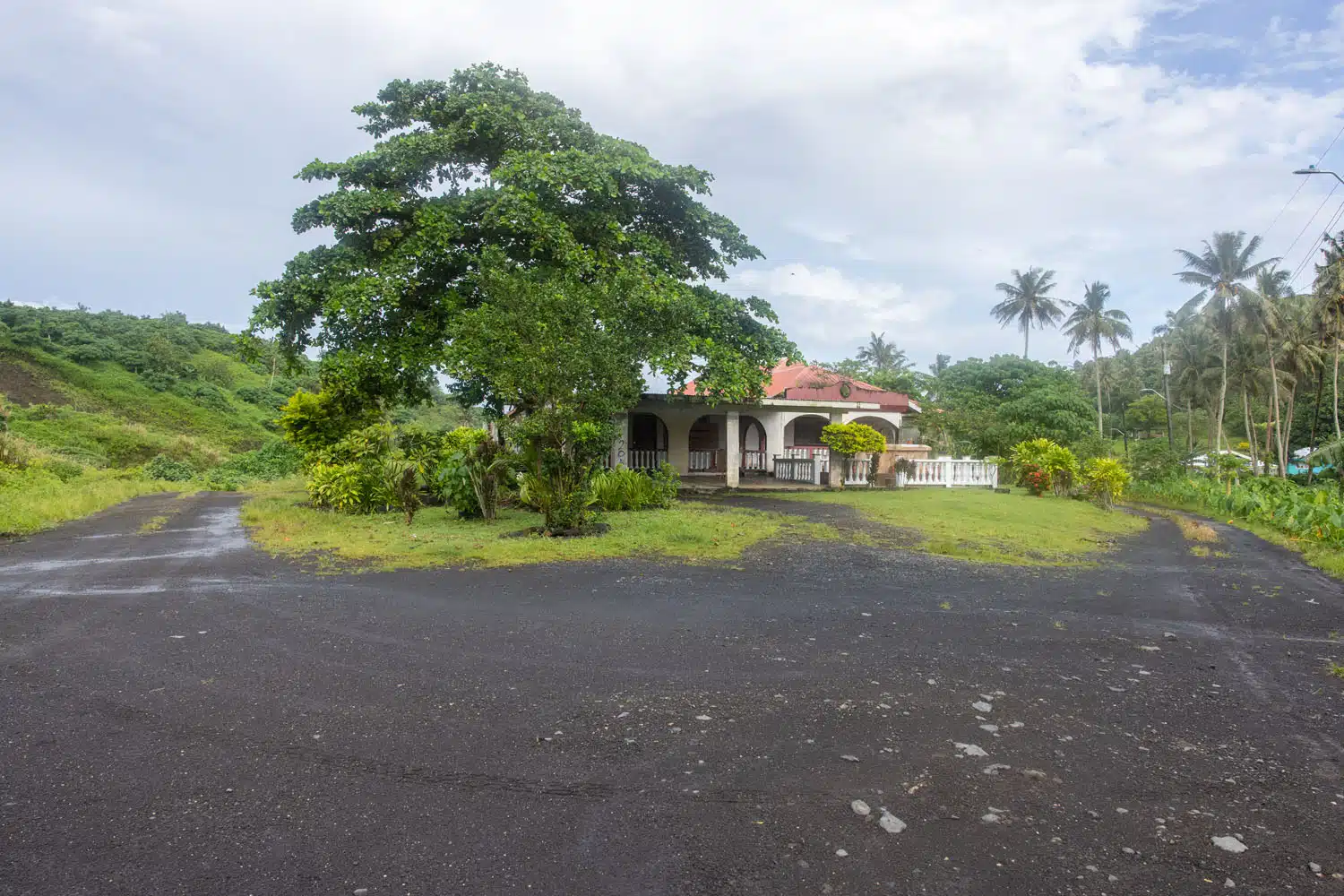
This is the first house you will get to. Go right to go to Fagatele Bay and go left to go to Larsen Bay (mentioned next).
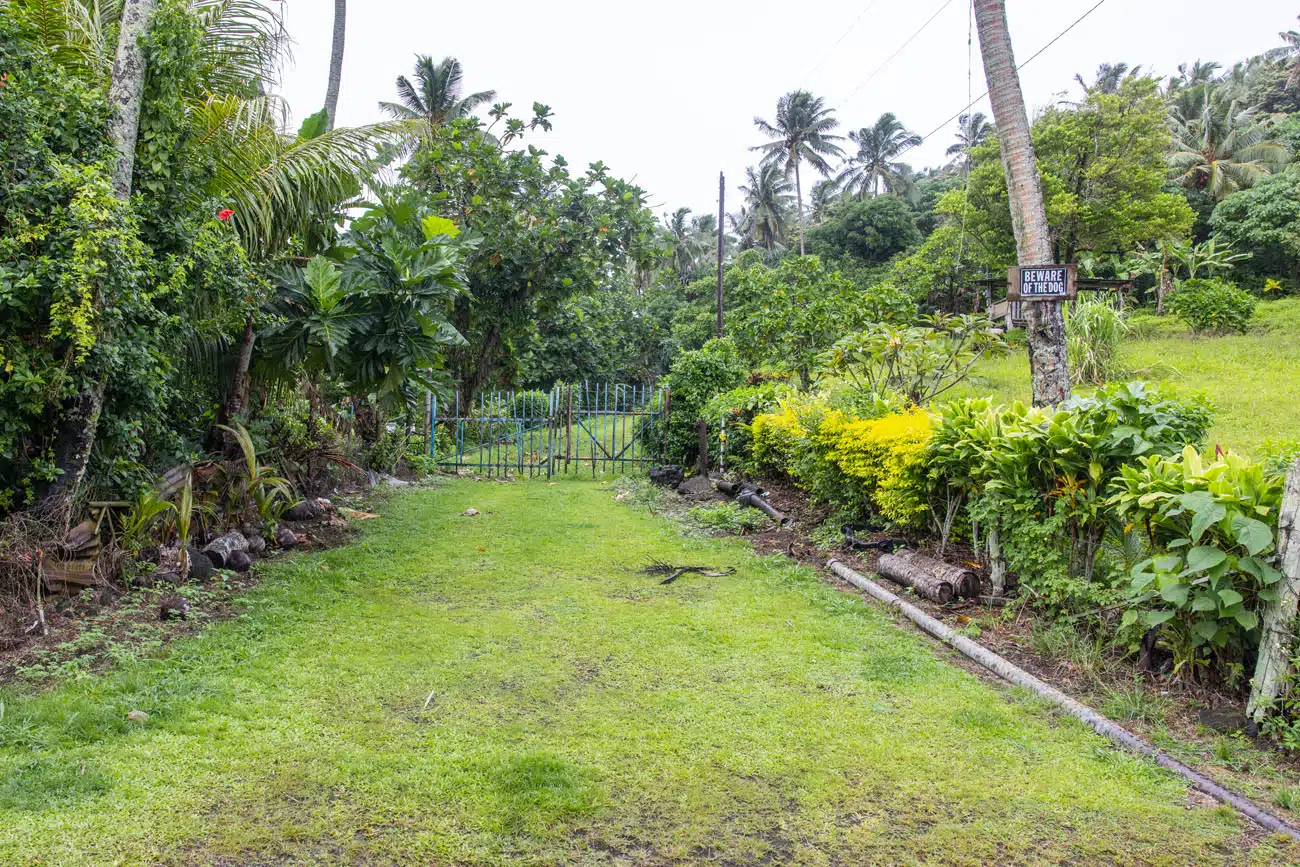
The gate and Beware of Dog sign at the property owner’s home for Fagatele Bay
The Trail to Fagatele Bay: From the property owners home, the wide trail leads you right to the rim of the old volcanic crater. At this point the trail splits, going left or right around the rim. Turn left in order to head down to the small hidden beach. The trail stays fairly wide for a bit and then narrows for the final descent down to the beach, ending with a wooden staircase. The entire trail is through the forest and unfortunately there isn’t a clearing to overlook the bay.
Fagatele Bay Trail Stats: 1.5 miles roundtrip with 420 feet of total ascent.
PRO TRAVEL TIP: Both Fagatele Bay and Larsen Bay require driving down a rough, dirt road to get to the trailheads. It’s not the most scenic drive, as you pass by a giant landfill. Plus, to visit both places, you will have to ask the landowners for permission. These are two of the most off the beaten path destinations in American Samoa, and it takes some work to get here, but as your reward, there is a good chance you could have them all to yourself. They are only worth it if you have a lot of time or want to visit a secluded beach, since they are so difficult to get to.
We turned around the first we attempted this, because of the setting and the multiple “Do Not Enter” signs. However, the park ranger for the National Park of American Samoa assured us that this was the right spot, so Tim returned on a different day to visit Larsen Bay and Fagatele Bay.
11. Fogama’a / Fagalua / Larsen Bay
Larsen Bay is another remote, quiet bay with a hidden or secret beach. The bay is made up of two coves; Fogama’a and Fagalua, and the beach here is larger than the one at Fagatele Bay. From this larger beach you can enjoy picturesque views of the surrounding cliffs and forest.
Larsen Bay was formed by a flooded volcanic crater and is part of the National Marine Sanctuary of American Samoa. And the Fogama’a Crater is a U.S. National Natural Landmark. Similar to Fagatele Bay, access is via private property so you do have to pay a fee in cash to the property owner. We were asked to pay $5 USD per person during our visit.
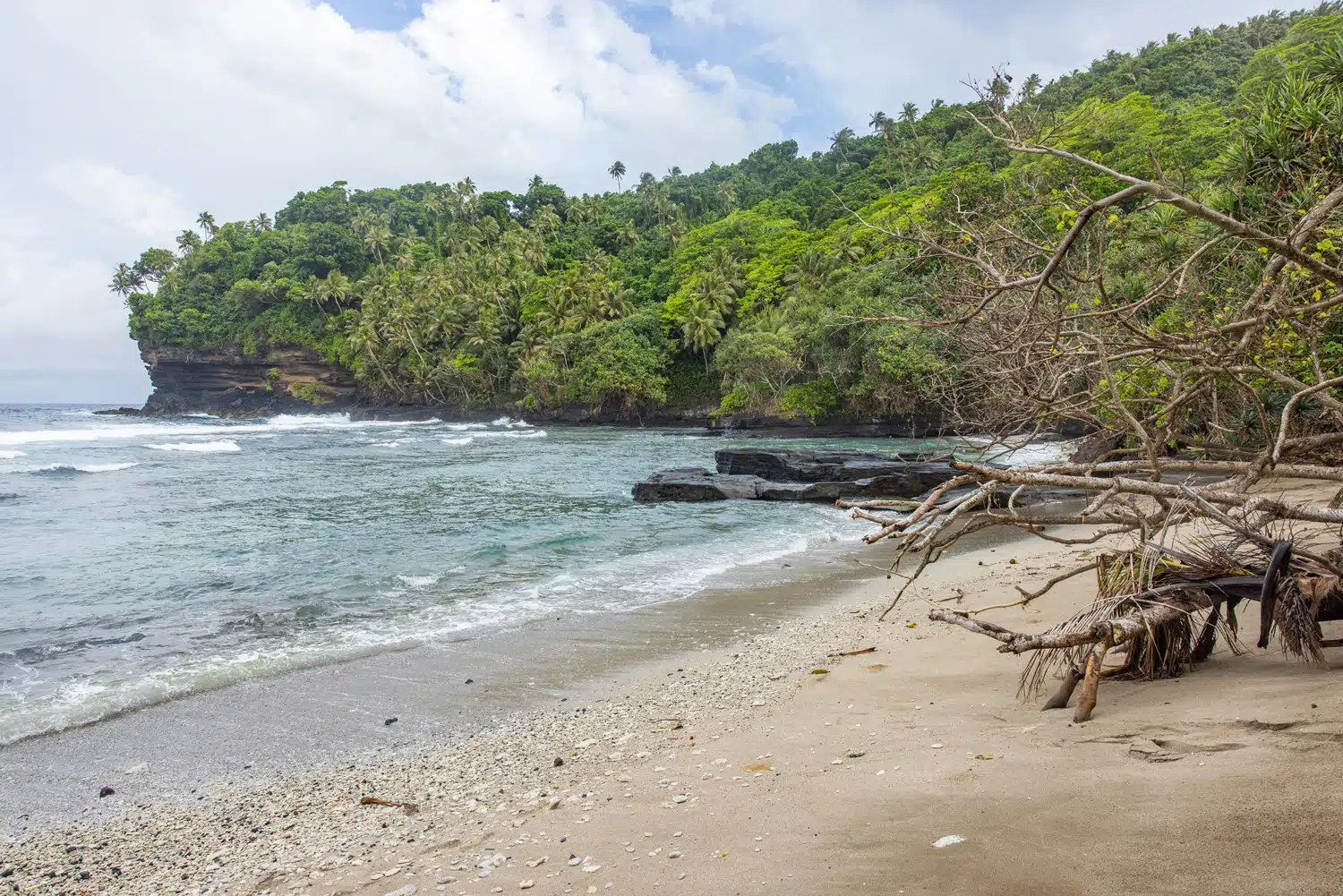
Larsen Bay
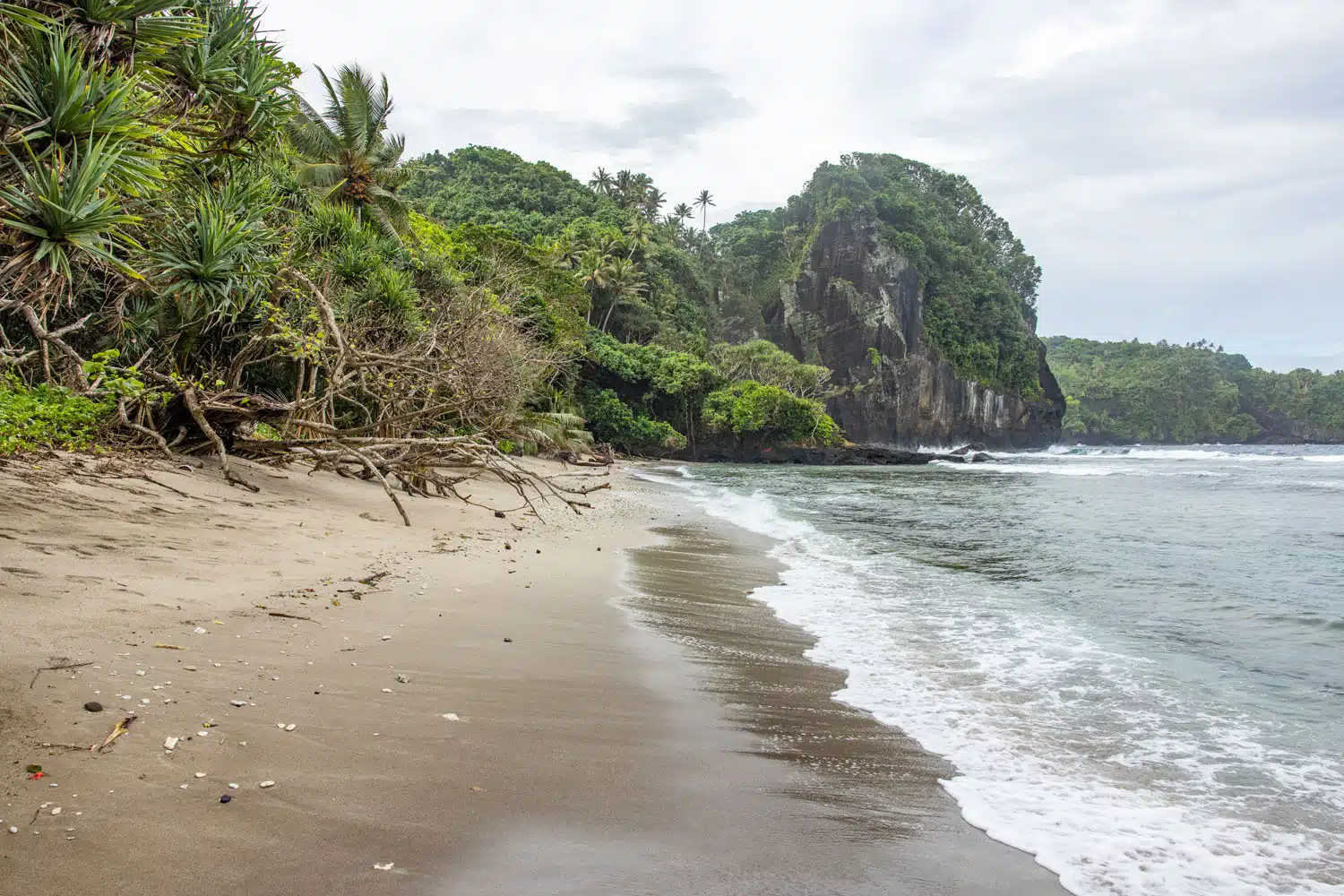
Larsen Bay
Getting to Larsen Bay: Follow the same directions provided for reaching Fagatele Bay but go to the left of the first visible home, the one I mentioned that appeared to be abandoned. The road will take you downhill to an old shack. Park near the shack avoiding any landfill activity that might be taking place. The owner didn’t speak much English and assumed I was looking for the more popular Fagatele Bay, but when I showed him Larsen Bay on Google Maps from my phone, he pointed me to the trail that starts behind his shack. If you have any problems then ask the person that lives at the Fagatele trailhead to help you, as he is familiar with both bays and his English was excellent.
The Trail to Larsen Bay: This trail isn’t as well maintained as the trail to Fagatele Bay. I had to walk through high grass until I reached the forest, at which point the trail became a dirt path and descended to the beach. This trail is on Google Maps which you might find useful to confirm you are headed in the right direction.
Larsen Bay Trail Stats: 0.75 miles roundtrip with 200 feet of total ascent.
12. Le’ala Shoreline
The Le’ala Shoreline, a U.S. National Natural Landmark, is a rocky coastline that runs from Vailoatai Village to Fagatele Bay. The dark rocks, tide pools, and tropical vegetation make it a photogenic coastline. Its appearance is similar to what you see at Turtle and Shark, which I thought was more picturesque.
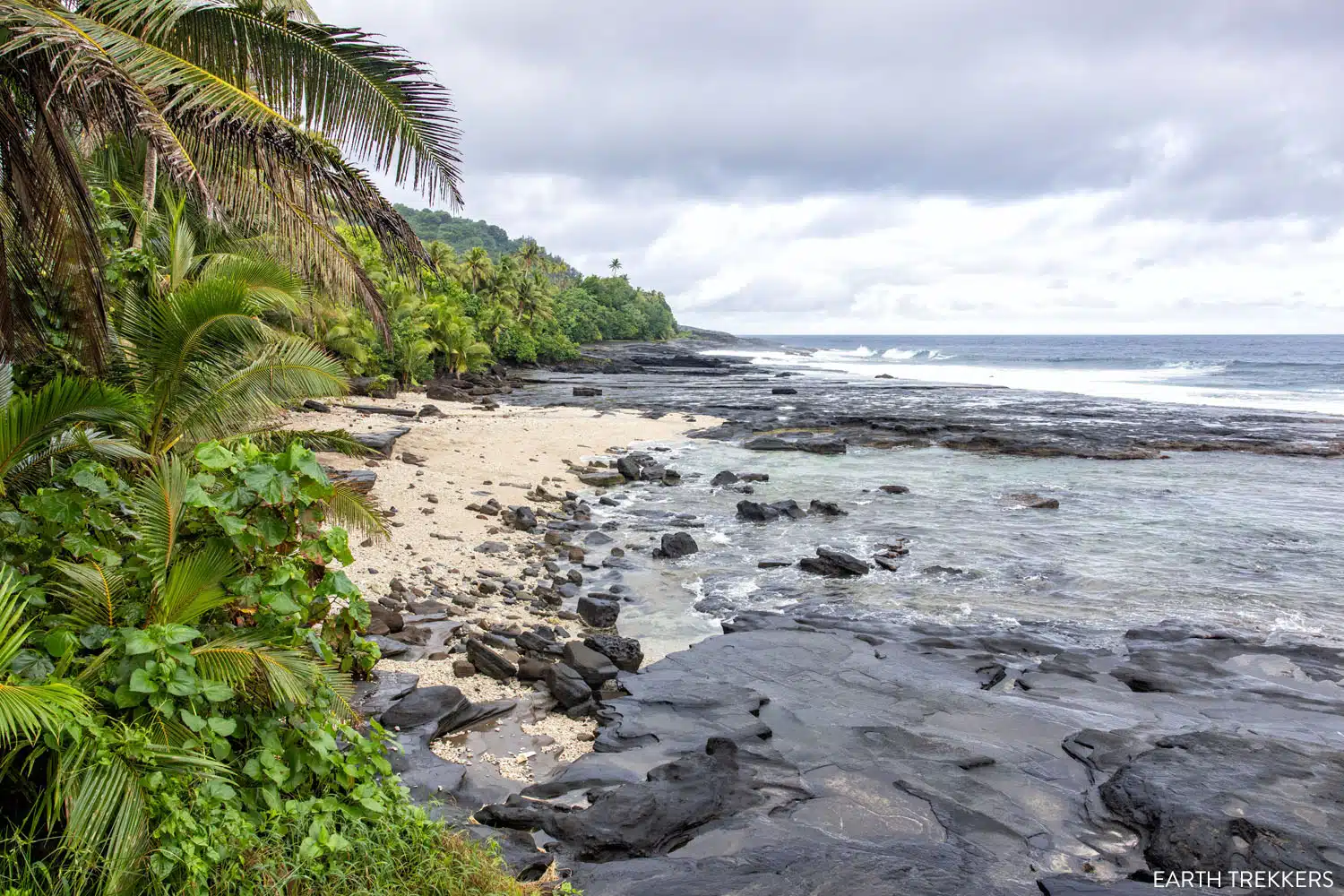
Le’ala Shoreline
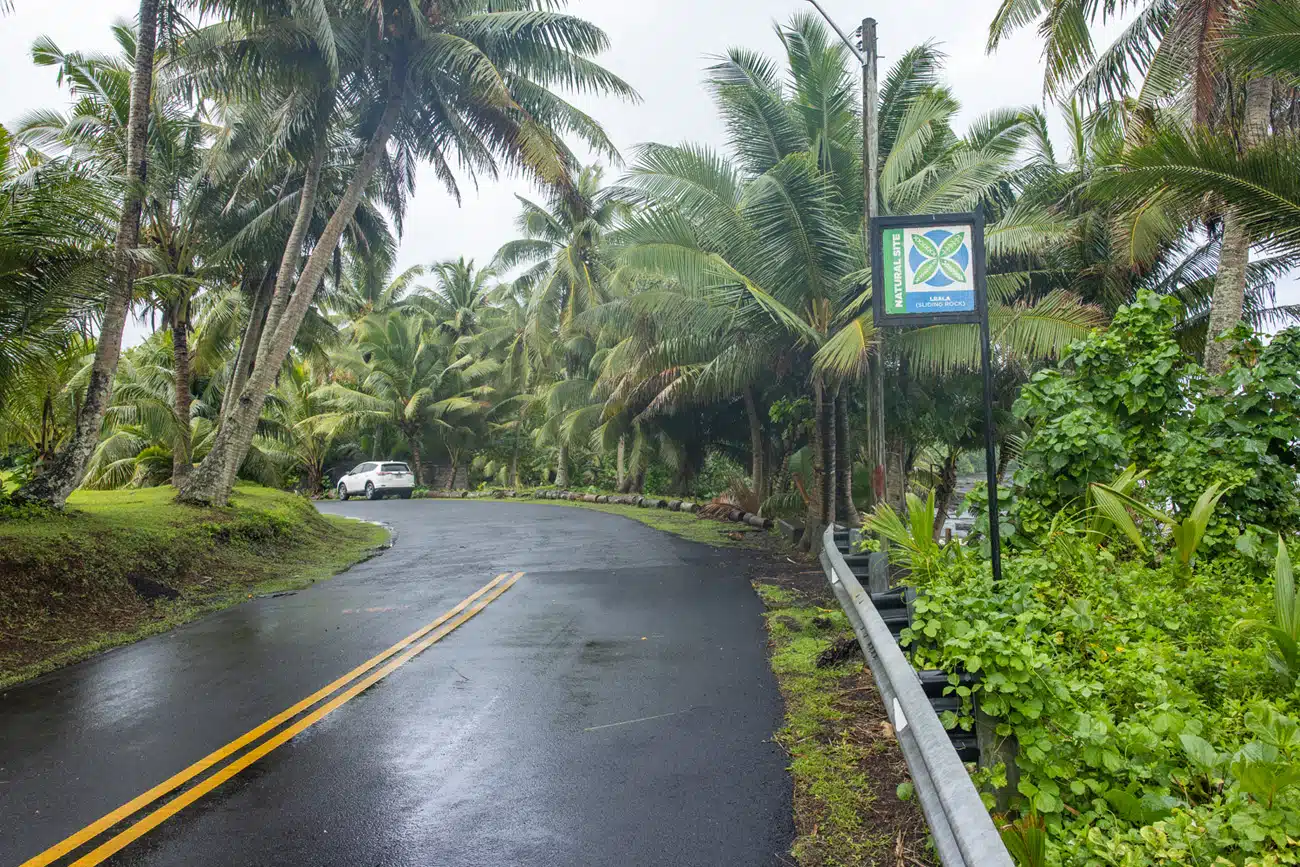
Le’ala Shoreline Parking
Getting to Le’ala Shoreline: Take Route 1 (Route 001 on Google Maps) to Puapua Village and turn onto Route 003 (as labeled on Google Maps). There are not any street signs at this junction, so it is helpful to use a digital map app, such as Google Maps, for navigation. Follow Route 003 until it reaches the coast. At this point there will be an almost 90 degree bend in the road. There is space along this bend to parallel park. There is also a signpost here indicating that you have reached the Le’ala Sliding Rock. There is a path next to this signpost you can follow down to the shore or you can find your way along the grassy area next to where you parked.
Exercise caution as you walk on the rocks along the coast here as they are extremely slippery.
13. Palagi Beach and Cape Taputapu
Palagi Beach and Cape Taputapu sit side-by-side on the far western tip of American Samoa. It’s a long, windy drive along the coastline to get here and all along the way, you will pass through small villages and are treated to more views of the beautiful American Samoa coastline.
If you drive up into the hills you come to a stunning viewpoint of Palagi Beach. Here are the GPS coordinates where I took this photo: 14°19’20.916″ S 170°49’57.396″ W.
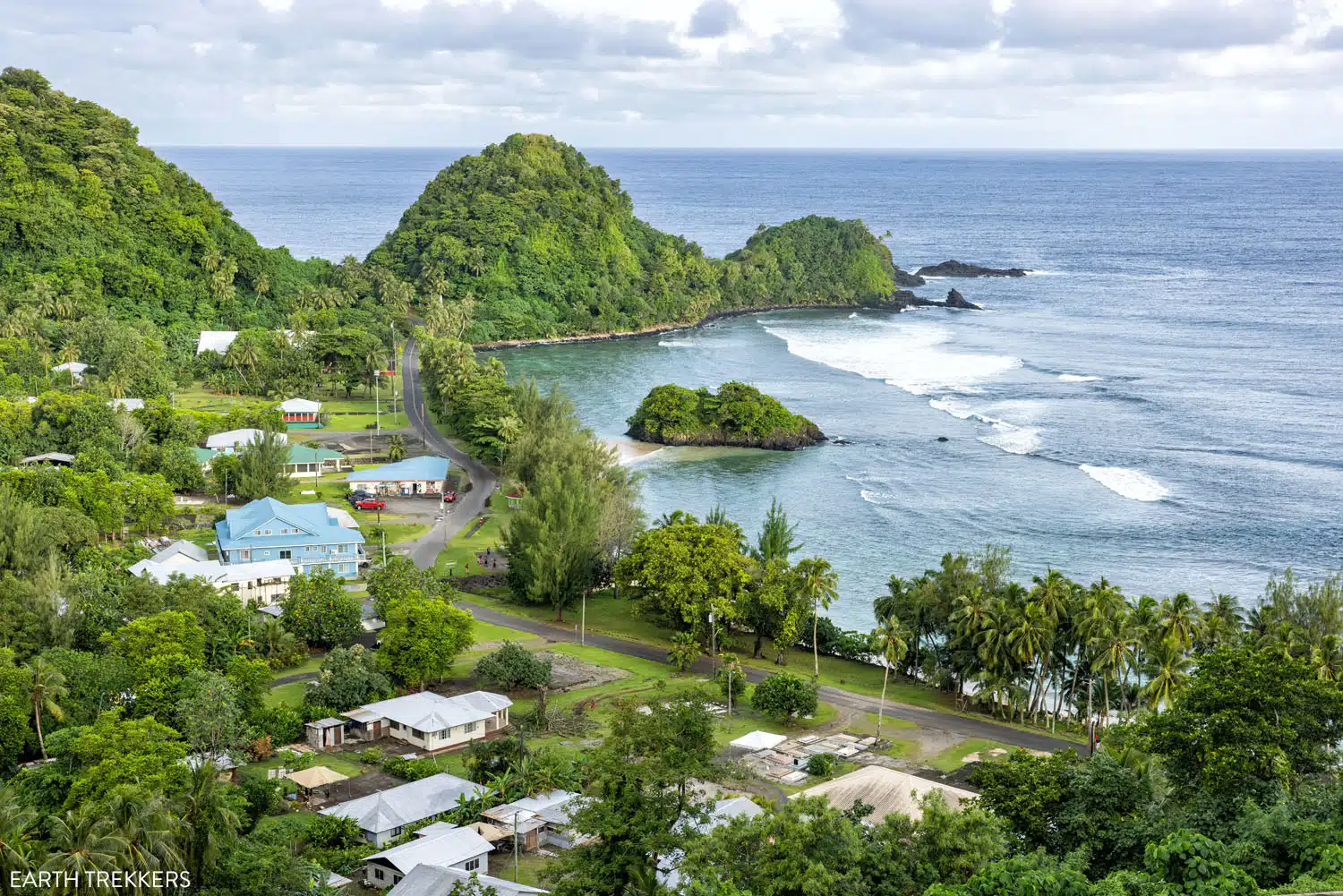
Overlooking Palagi Beach and Amanave
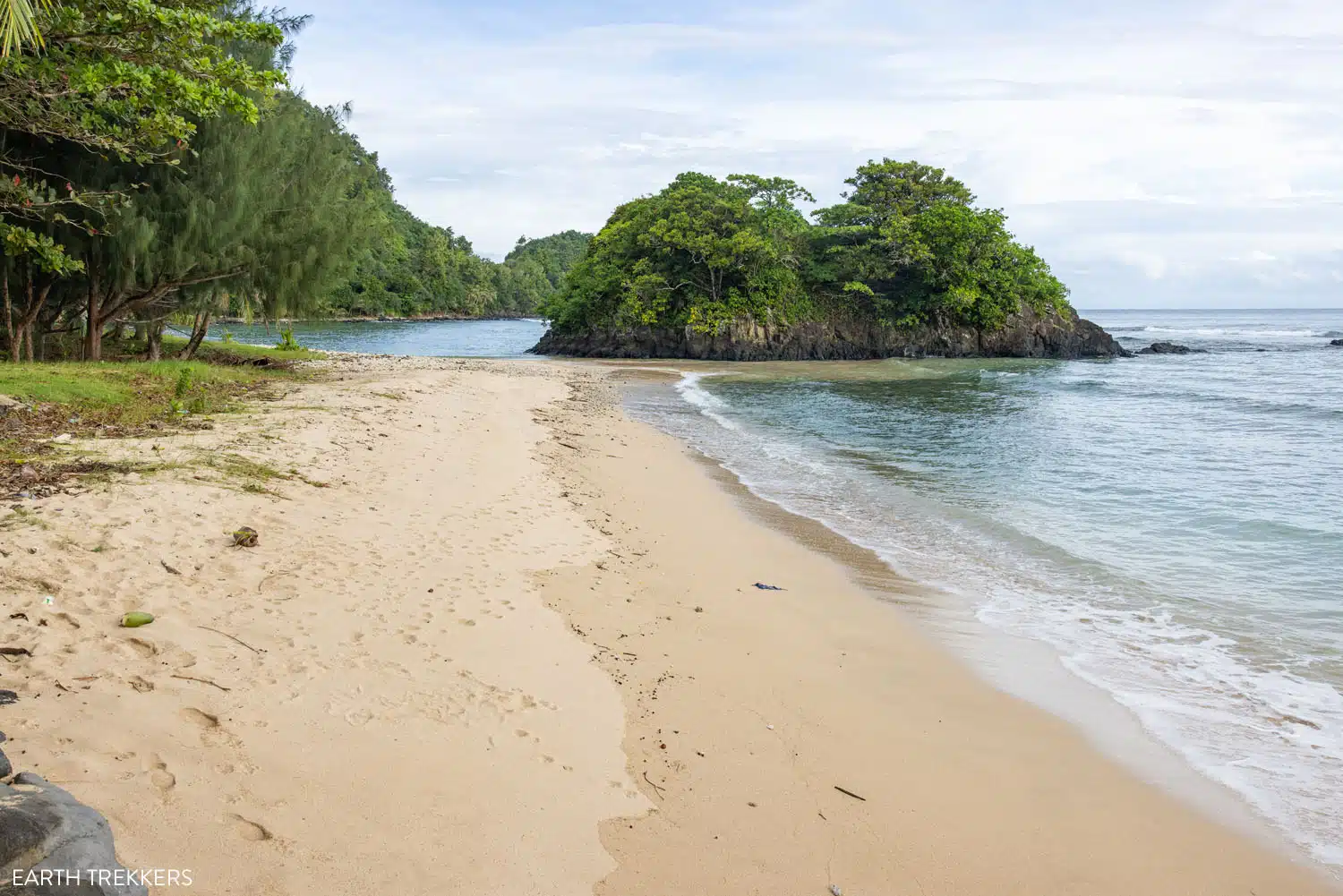
Palagi Beach
14. Two Dollar Beach
Two Dollar Beach is a small strip of sand wedged between the coastline and a small island. Fales overlook the beach and these are available to be rented for the day. This is a great place to spend a few hours, if you like the idea of relaxing on the beach in a lovely, protected spot.
There is a small fee to enter ($5 per person in 2023). Onsite are bathrooms and BBQ grills. Learn more on their website.
Two Dollar Beach is located in Avaio, in the Eastern District, along Route 001.
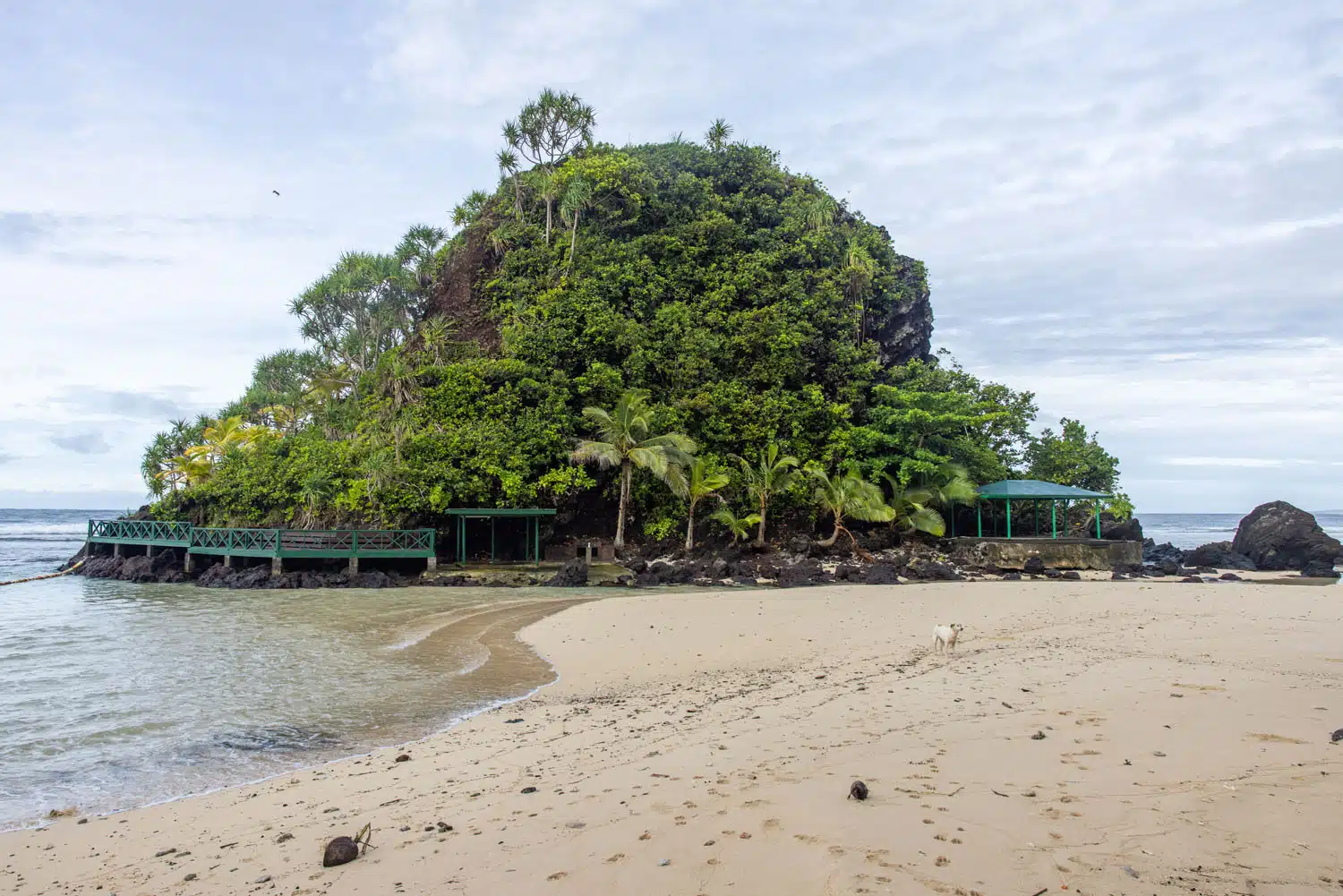
Two Dollar Beach
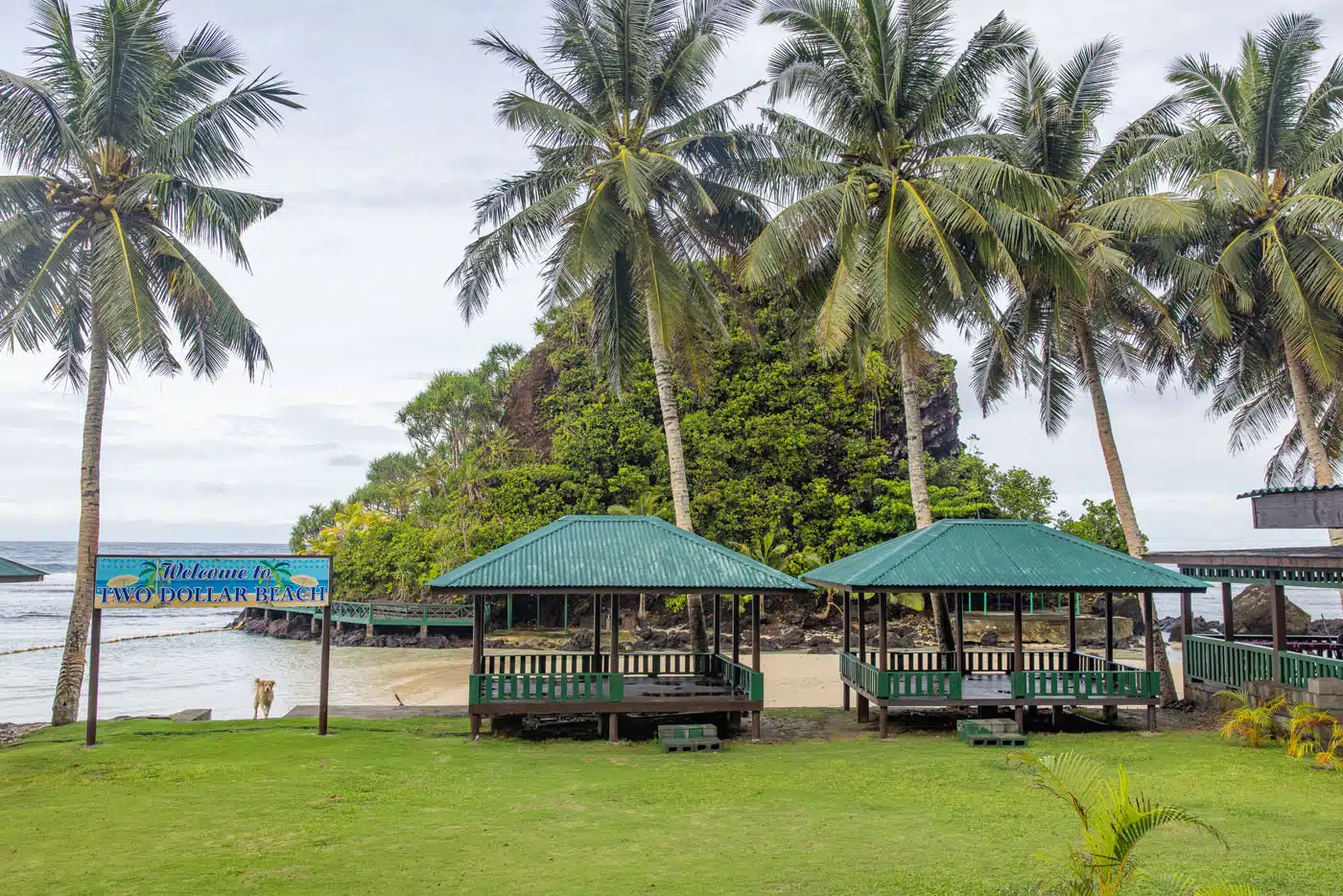
Fales on Two Dollar Beach
15. Scenic Drive from Breakers Point to ‘Au’asi
The drive on Route 001 from Breakers Point to ‘Au’asi takes you past some of the best scenery and landscapes on the island of Tutuila. As the road twists and turns along the coastline, you get endless viewpoints of the rugged coastline, white sandy beaches lined with palm trees, and the clear, aquamarine sea.
Driving this road was one of our favorite experiences in American Samoa and we thought this part of the island was prettier than the National Park areas on Tutuila Island.
This drive is 8.7 miles (14 km) one way and takes about 20 minutes, plus more time for photos.
Along this drive, you will pass Two Dollar Beach and Tisa’s Barefoot Bar (a must-do in American Samoa and mentioned later in this guide). The drive ends in the village of ‘Au’asi, where you have the option to take the boat to Aunu’u island.
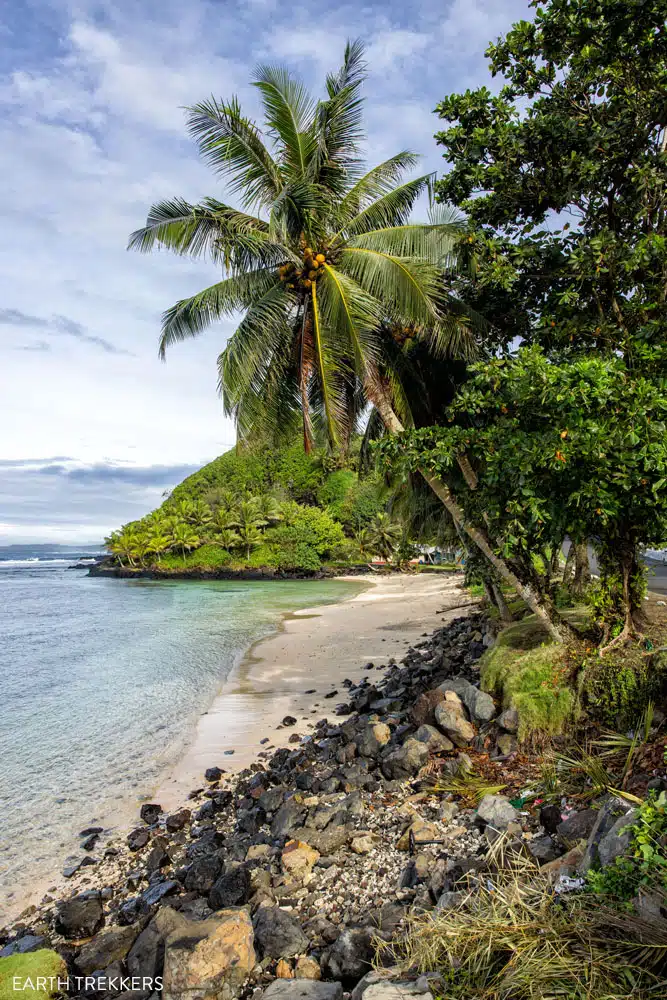
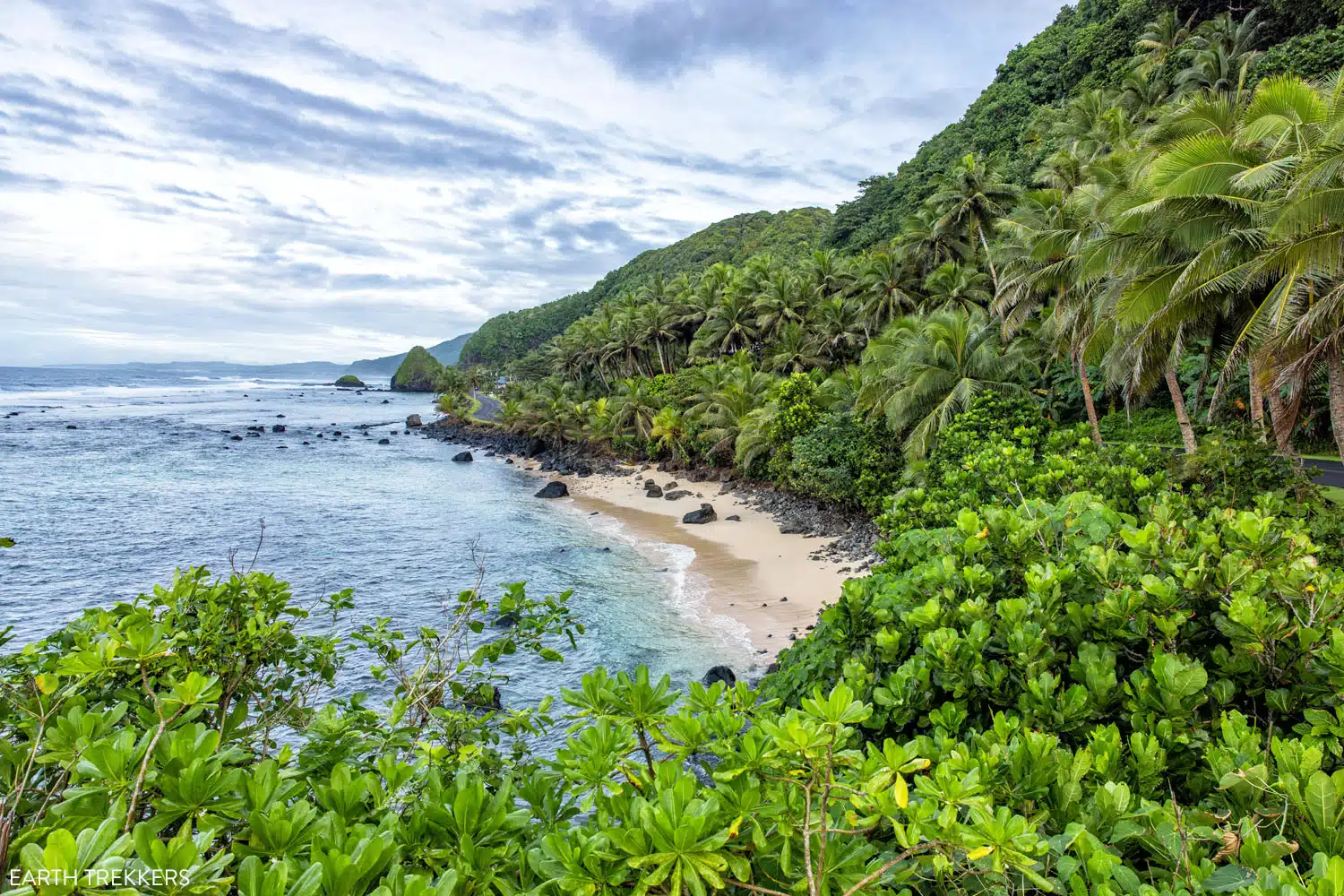
Driving along the south coast of American Samoa
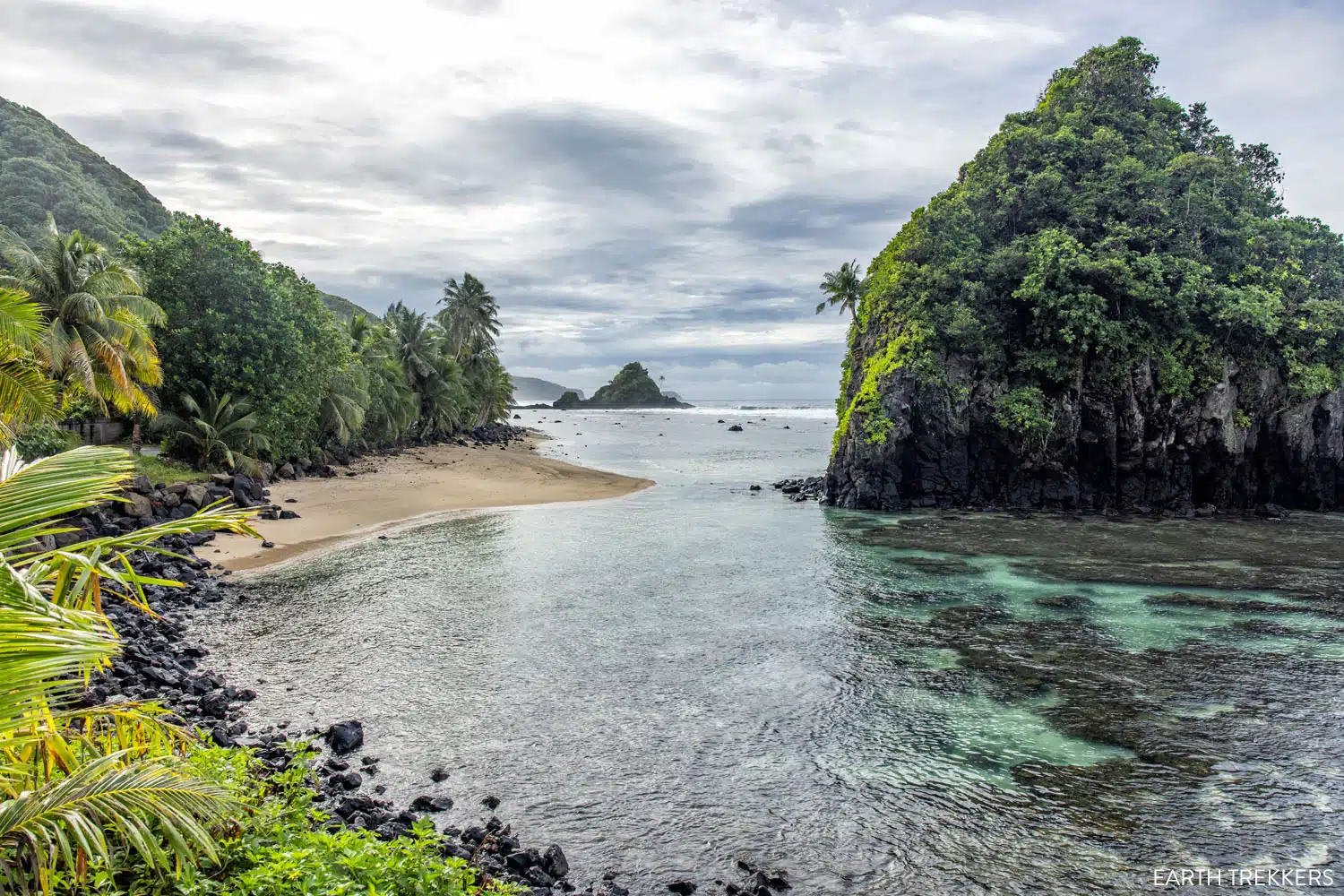
Another view of the south coast
16. Aunu’u Island National Natural Landmark
Aunu’u Island is a very small island that sits off the southeast coast of American Samoa. The island is a National Natural Landmark.
To get here, hire a boat in the marina in ‘Au’asi. When we did this, several boats and their captains were at the marina, waiting for the next guests to arrive, so we did not have to wait for the boat. We paid $5 per person for a one-way trip to Aunu’u Island.

‘Au’asi marina
It takes about 10 minutes to travel to the island and along the way, views of Tutuila Island really open up. One of the best reasons to journey out to Aunu’u Island is for the views of Tutuila Island.
Before the boat returned to the mainland, Tim got the name and phone number of the boat captain, just in case there wasn’t a boat at the island marina once we were ready to return to Tutuila.
Prior to our visit, Tim read about a hiking trail that circles the island and takes you to views of quicksand.
From the marina on Aunu’u Island, we started off walking clockwise around the island on the trail, first passing the Aunu’u Church. The trail, which is an old 4×4 road, runs along the edge of the beach and is mostly under the cover of palm trees.
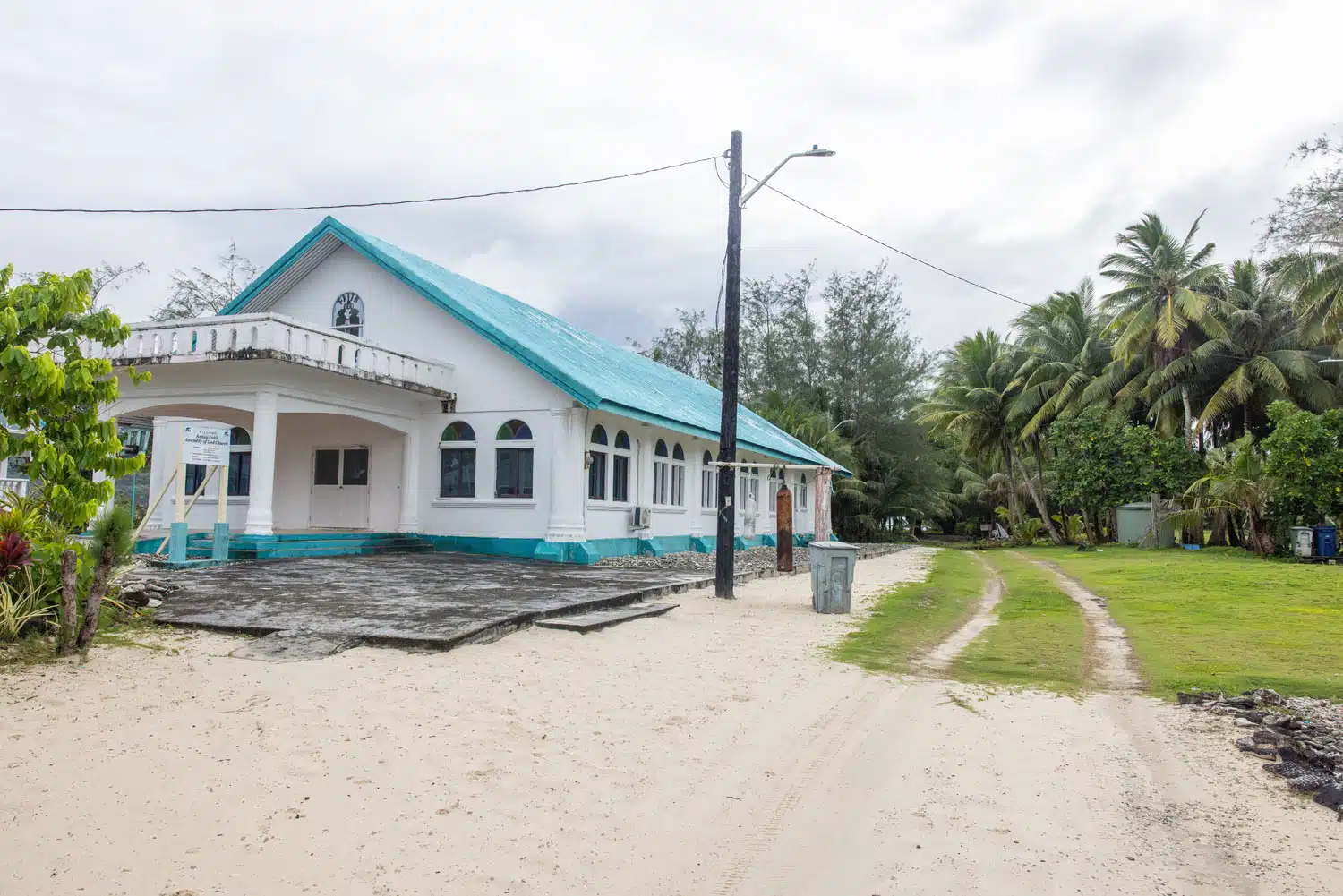
The 4×4 road/hiking trail starts next to this blue and white church
Near the north end of the island, you emerge from under the palm trees. Eventually, to your right there will be a swampy-looking lake. This is Pala Lake, the location of the quicksand. It was not nearly as exciting as we hoped it would be and we do not think it is worth traveling out to Aunu’u Island just to see this.

Pala Lake
Beyond Pala Lake, the 4×4 road that we were following was overgrown with plants and the farther we went, the harder it got to follow the trail.
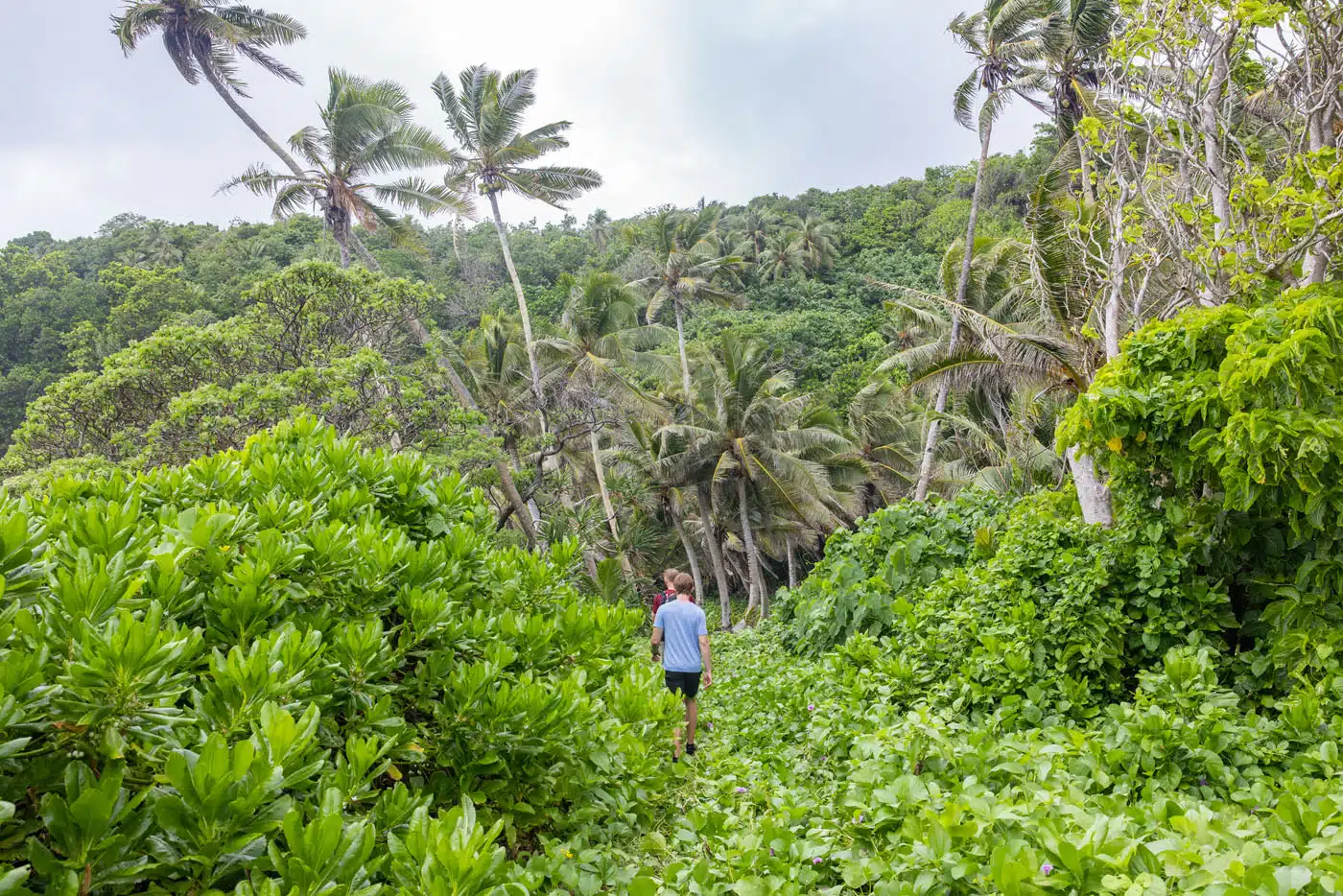
The trail ended next to a beautiful but small beach. A small archway of rock on the coastal cliffs added to the beauty. We attempted to keep walking through the thick brush, but it became apparent that this 4×4 trail has not been cleared or hiked in some time. So, we turned around and retraced our steps back to the marina.
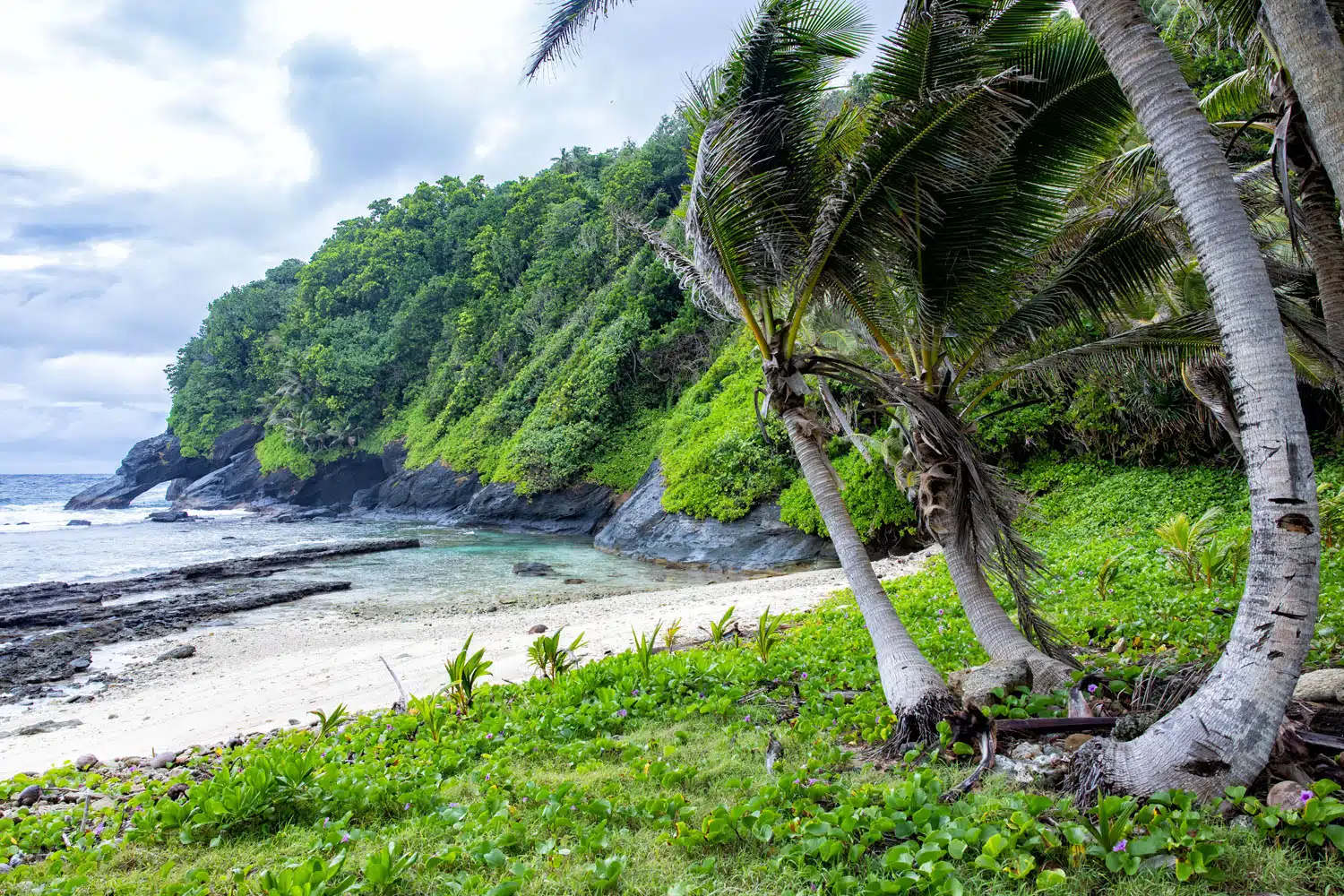
Beach and rock arch along the Aunu’u Island Trail
There were several trails that we hiked on the island that were very overgrown. In 2023, tourism was just beginning to return to American Samoa, and it looked as if not much trail maintenance had been done since the start of the pandemic.
However, it was a beautiful walk back to the marina. Now we were walking towards Tutuila and the views were incredible.
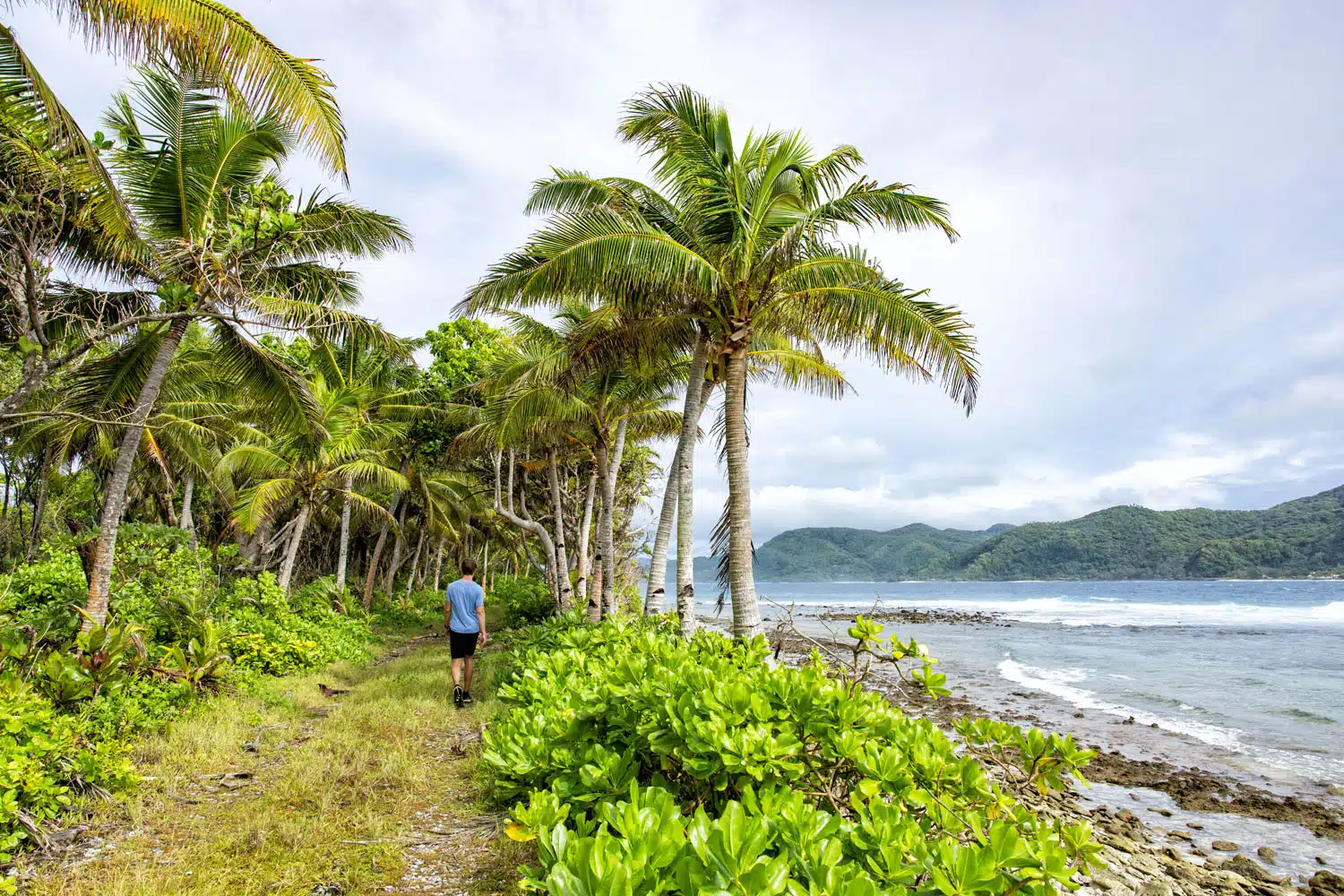
The walk back to the marina on Aunu’u Island
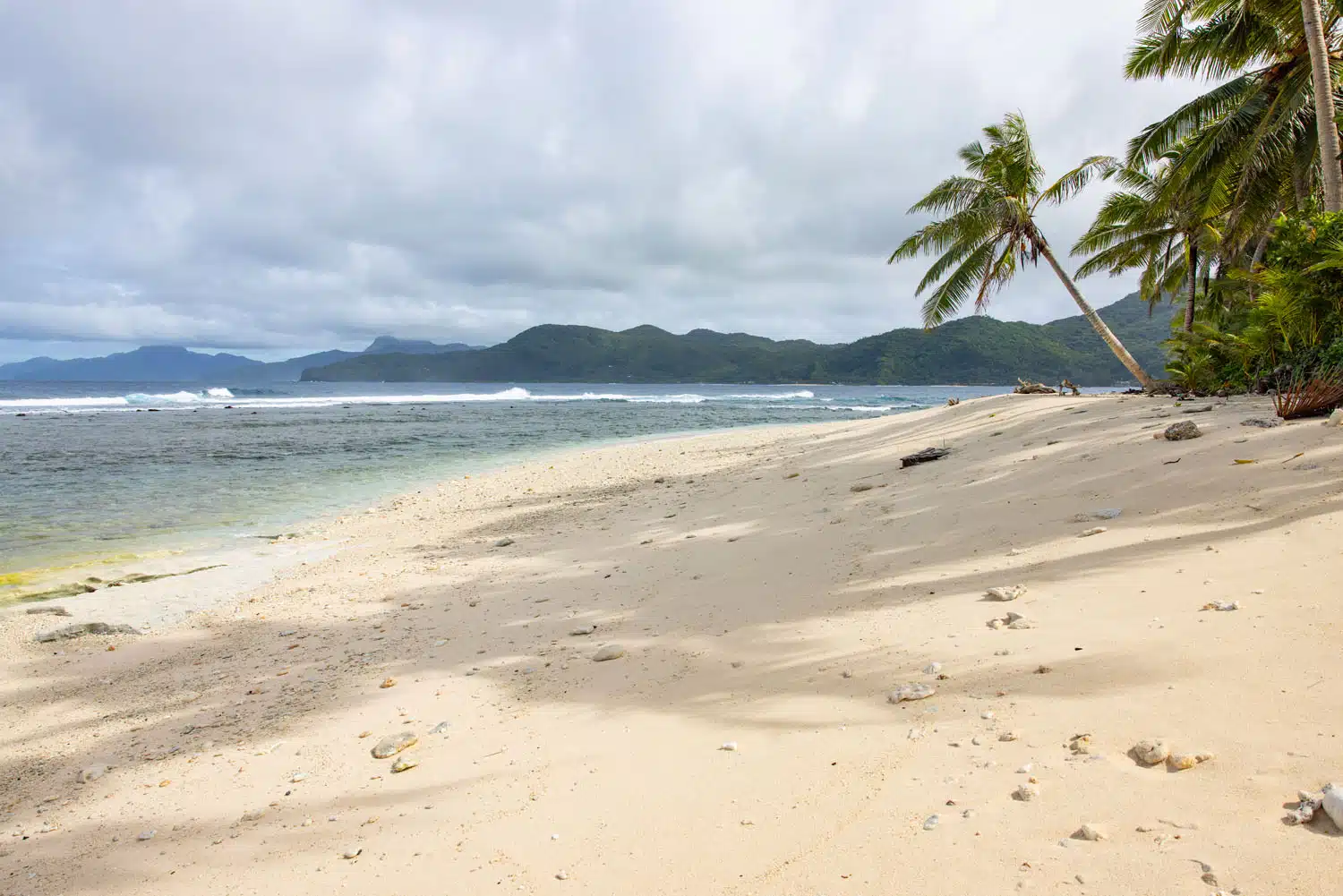
Aunu’u Island beach
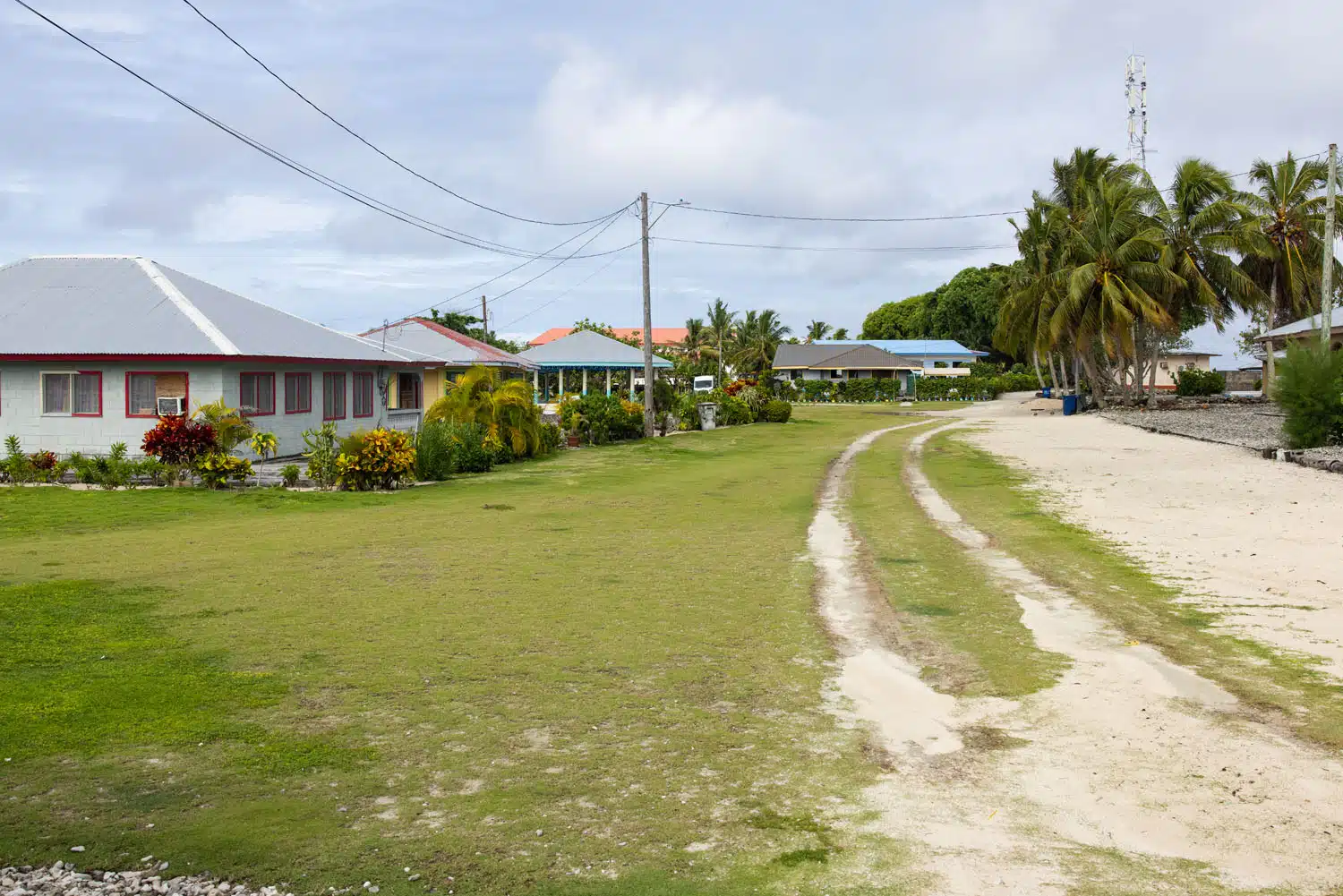
Houses on Aunu’u Island
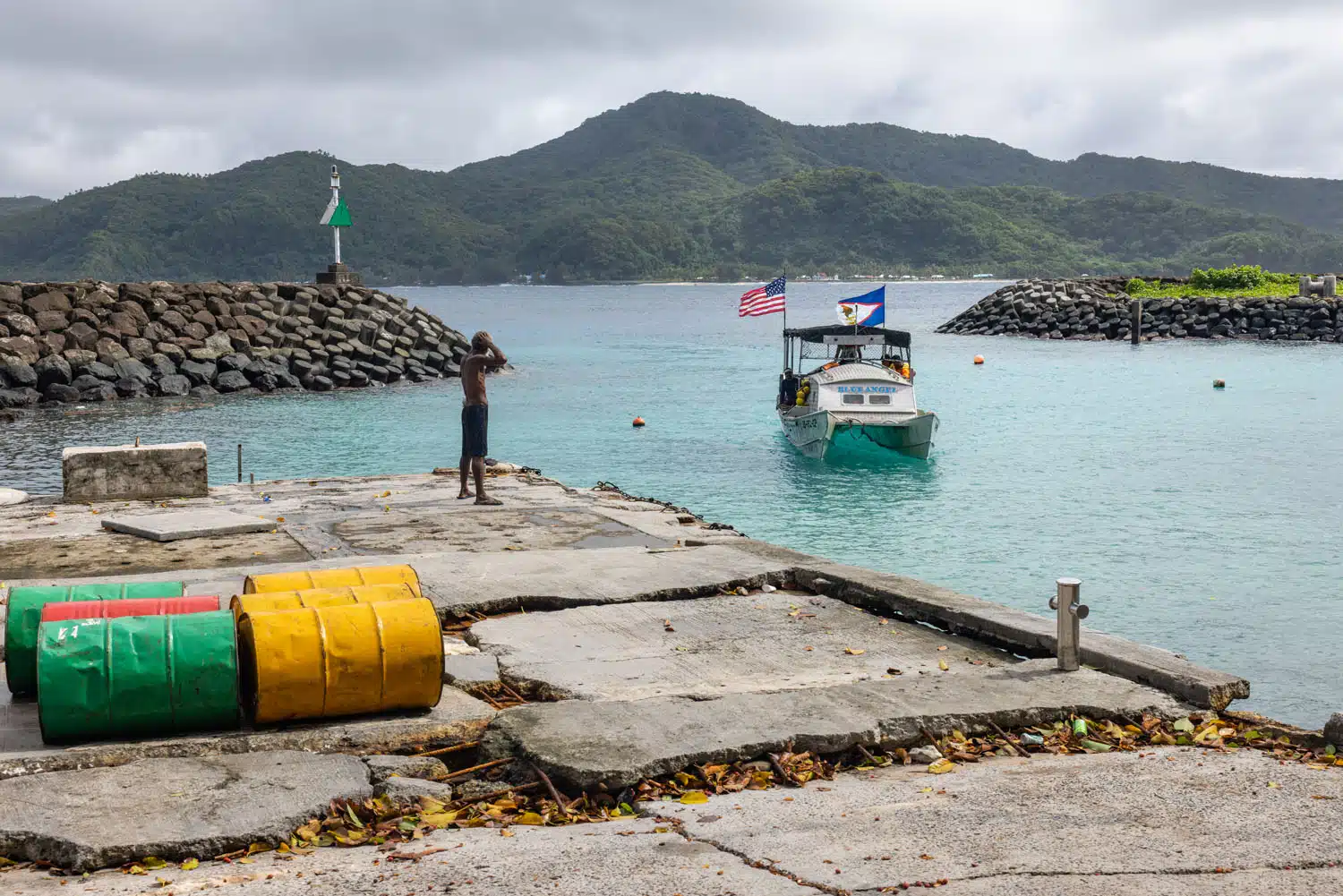
Aunu’u Island Marina
On our walk, we passed the marina just a short way for photos of a nearby beach. Then, Tim called the boat captain (there were no boats here) and 10 minutes later we were on our way back to Tutuila Island.
Traveling out to Aunu’u Island was one of the highlights for us. The walk from the marina, past Pala Lake, to the small beach, is totally flat and 2 miles round trip. It took us one hour to do this walk. The best part is the remoteness of the island (we saw just a handful of villagers) and the views of Tutuila Island.
However, I didn’t see any bathrooms or shops, so you will need to bring whatever you need, including food and water during the walk.
17. Tisa’s Barefoot Bar
Lunch at Tisa’s Barefoot Bar is one of our favorite experiences in American Samoa. The food is incredible and the setting is unbeatable. This is by far one of the best things to do in American Samoa.
Tisa’s Barefoot Bar is located on Route 001 on the south coast of Tutuila, not far from Two Dollar Beach.
A conglomeration of small buildings, treehouses, and decks overlook one of the most beautiful beaches on Tutuila. The beach is a sea turtle nesting spot and the reefs are one of the better snorkeling locations on the island.
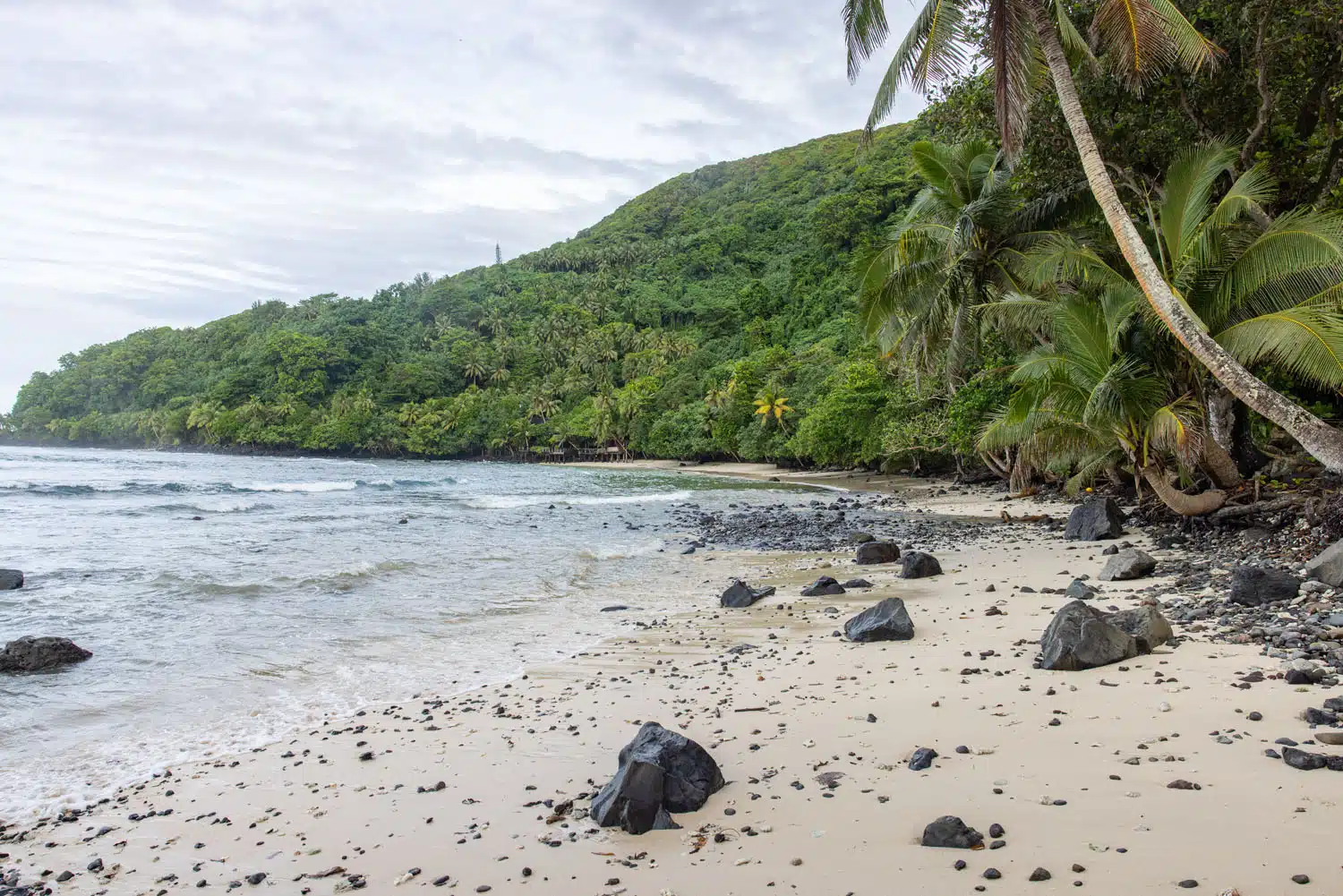
Alega Beach and, in the distance, Tisa’s Barefoot Bar
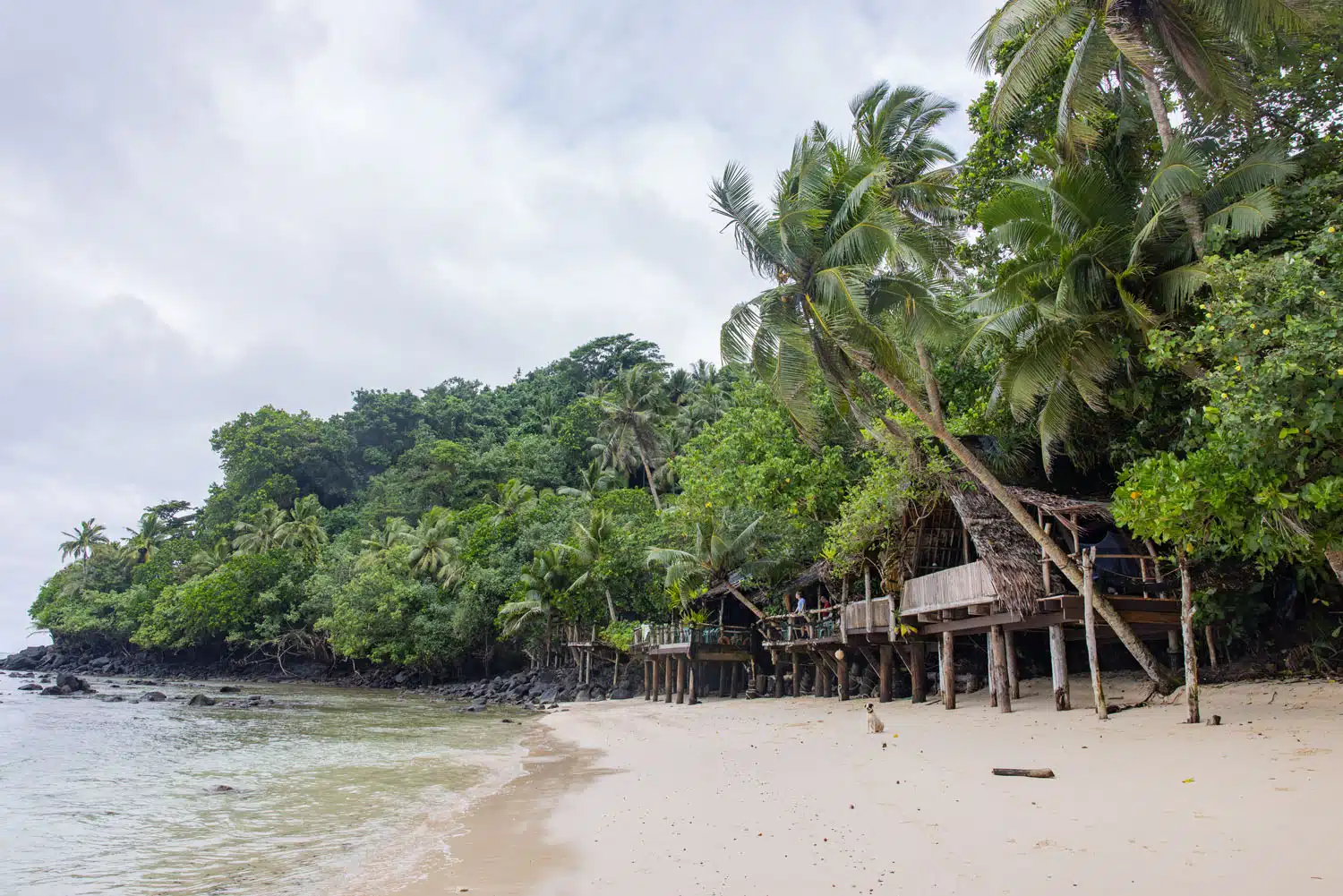
Tisa’s Barefoot Bar
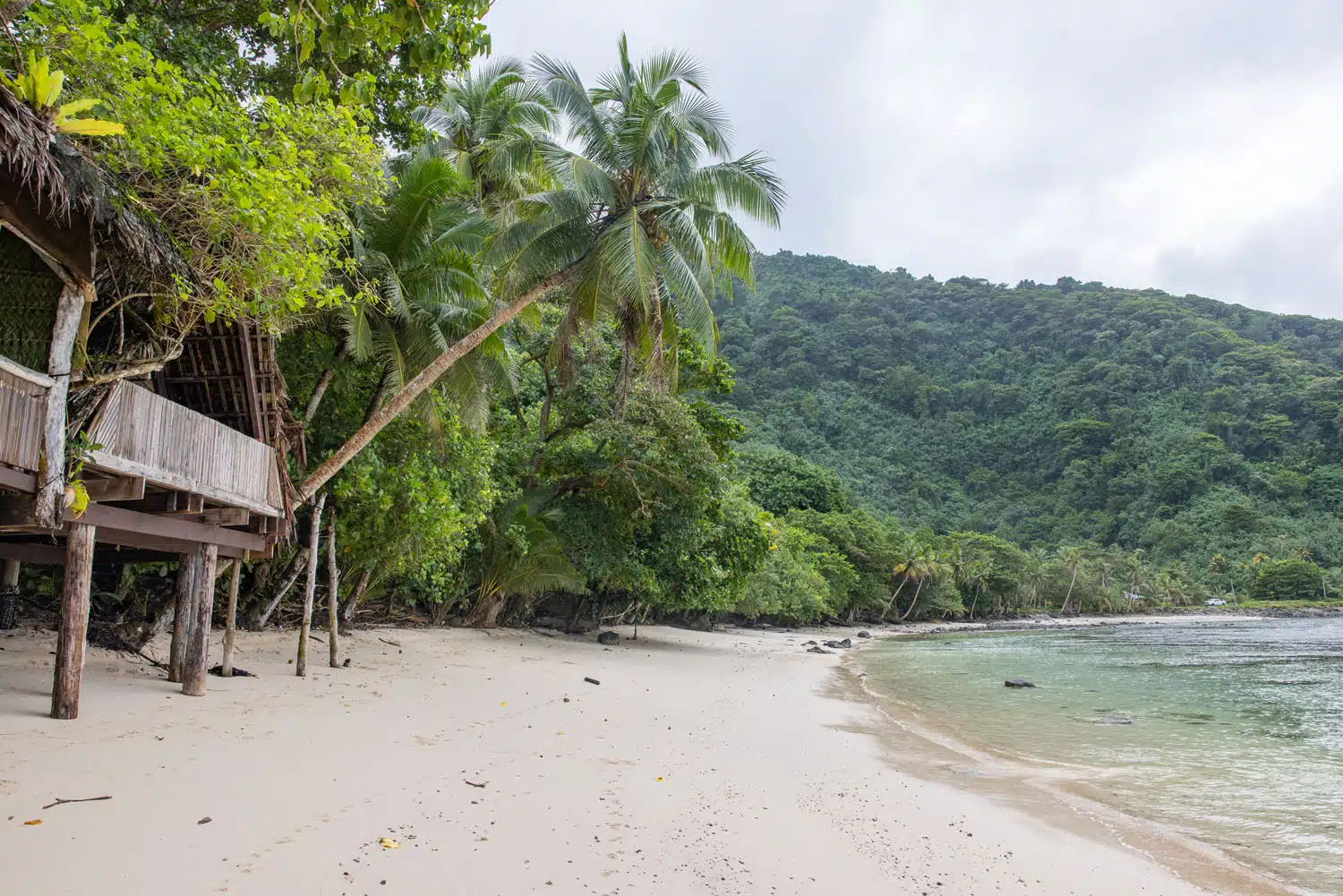
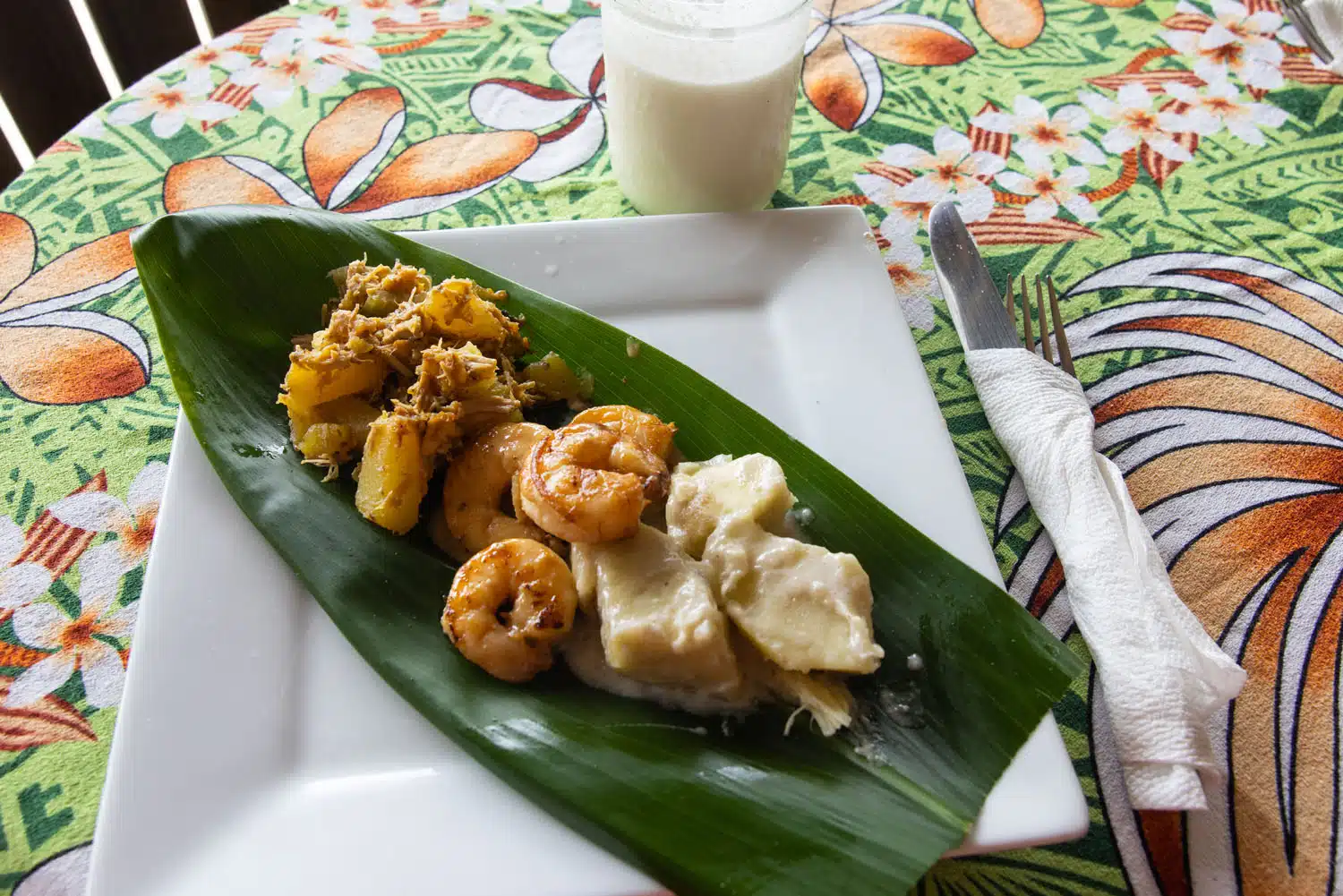
Lunch at Tisa’s Barefoot Bar
We had our best meal in American Samoa here, drinking homemade pina coladas and dining on sauteed shrimp and breadfruit. Tisa and the Candyman, the owners of this restaurant/bar/eco lodge, are warm, friendly, and welcoming. They made us feel right at home.
It’s best to make a reservation in advance because they cook lunch for a limited number of people each day. Learn more about their story, their special events, and how to contact them on their website.
They do not accept credit cards so make sure you have enough cash. We paid about $100 for our lunch ($25 per person plus three pina coladas).
18. The Manu’a Islands
The Manu’a islands (Ofu, Ta’u, and Olosega) are located 110 kilometers (68 miles) east of Tutuila. These islands offer remote beaches, lush mountainous rainforests, and pristine coral reefs perfect for snorkeling.
Ofu Beach is sometimes called the most beautiful, untouched beach in the world.
Getting here can be challenging, since flights to and from these islands only run a few days per week.
For more details on things to do on the Manu’a Islands and how to get here, take a look at our Guide to the National Park of American Samoa.
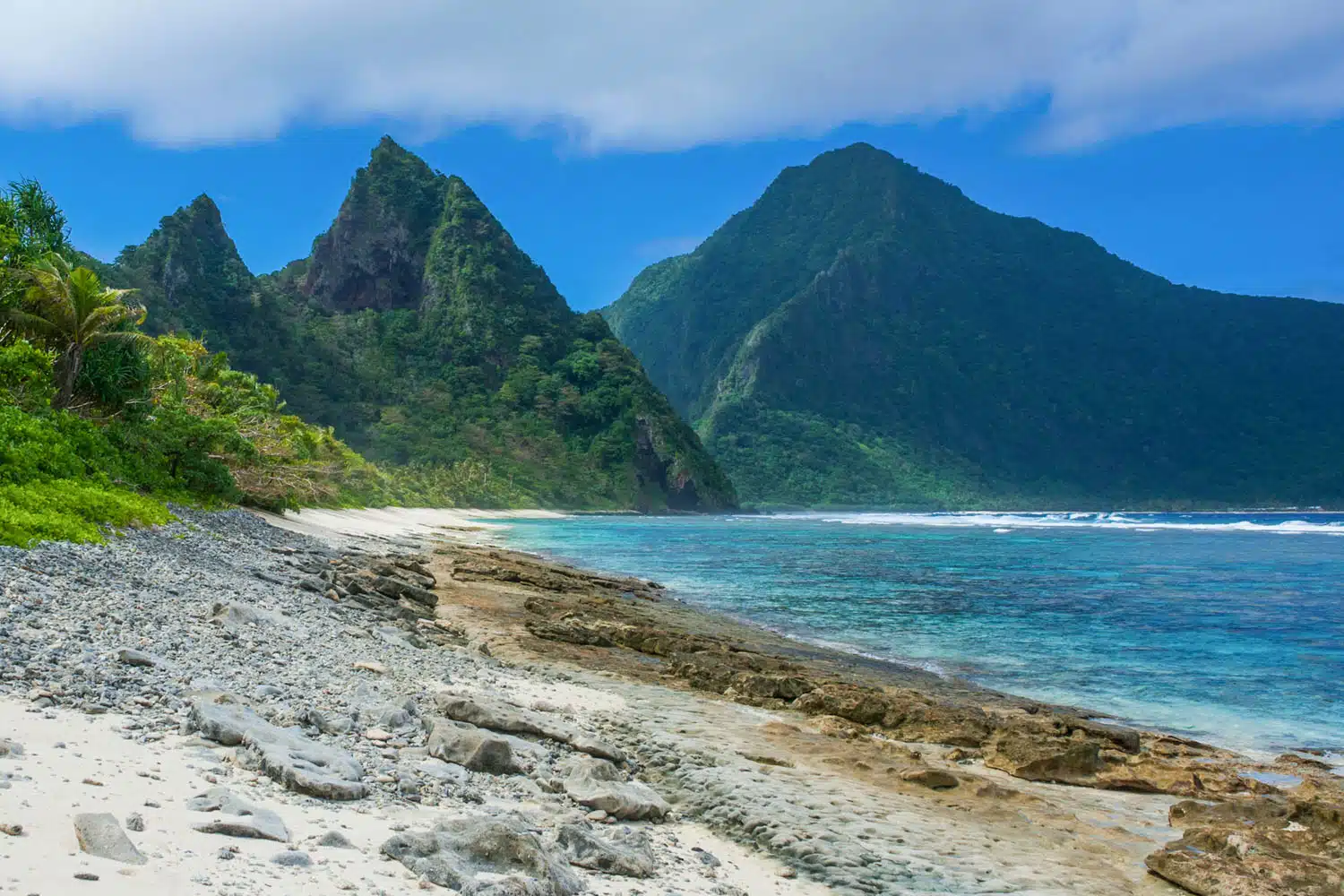
Ofu Island | Danita Delimont/shutterstock.com
Best Things to Do in American Samoa: On a Map
How to Use This Map: Click the icons on the map to get more information about each point of interest. To take this map with you, click the star next to the title of the map which adds it to your Google account. Next, within your Google Maps app, select ‘Saved’ and then select ‘Maps’. This map title will now appear in your list.
Our 10 Favorite Things to Do in American Samoa
Narrowing down the long list above, here are our ten favorite experiences in American Samoa.
- Visiting the National Park of American Samoa
- Tisa’s Barefoot Bar
- Visiting Aunu’u Island
- Turtle and Shark
- Scenic drive from Breakers Point to ‘Au’asi
- Two Dollar Beach
- Palagi Beach viewpoint
- Viewpoint next to the tramway
- Fatumafuti Beach
- Dinner at Sadies By the Bay
More Things to Do in American Samoa
Below we list a few more things to do in American Samoa. These came up in our research but we didn’t think they were worth it (but it’s still good for you to know about them…and maybe give them a pass, too.)
Breakers Point Trail
This short hike gets listed a lot and it is said to provide nice views of Pago Pago Harbor. We attempted it but the trail was completely overgrown and inaccessible in 2023 so we weren’t able to do it.
Utulei Beach Park
This very small beach and park sits on a prominence in Pago Pago next to the Tauese PF Sunia Ocean Center. To get to the beach, I walked past several dumpsters, with the nearby area littered with trash, to walk out onto the grassy area. There is a very small beach here but it doesn’t come close to the beauty of the beaches already mentioned in this guide.
How to Get Around American Samoa
The best way to get around American Samoa is to rent a car. This gives you the freedom to travel on your own schedule.
We rented a car from Avis. The rental office is located off site from the airport and it is located inside of the Toyota dealership maintenance department. We were picked up from the airport and driven here to complete our paperwork.
The car we rented was in terrible shape. It looked perfectly fine on the outside but inside it was dirty. The seat covers were filthy, there was dried blood on the ceiling of the car, and the cup holder had a nasty film in the bottom of it.
Tim latched his seatbelt and then couldn’t get it undone, so he just wore the top strap when driving around the island. With a speed limit of 20 miles per hour (in some spots it got up to 25 mph but everyone still drove 20 mph), the risk of getting in a horrible car accident was extremely low.
We had just had a similar rental car experience in Samoa so dealt with this car on our three days in American Samoa. Don’t expect a spotless car like you would get from Avis elsewhere in the world.
If you don’t want to rent a car, you can use the public bus system. Called “aiga” or family buses, for a small fee you can be driven from point to point on the island. However, there is no bus schedule.
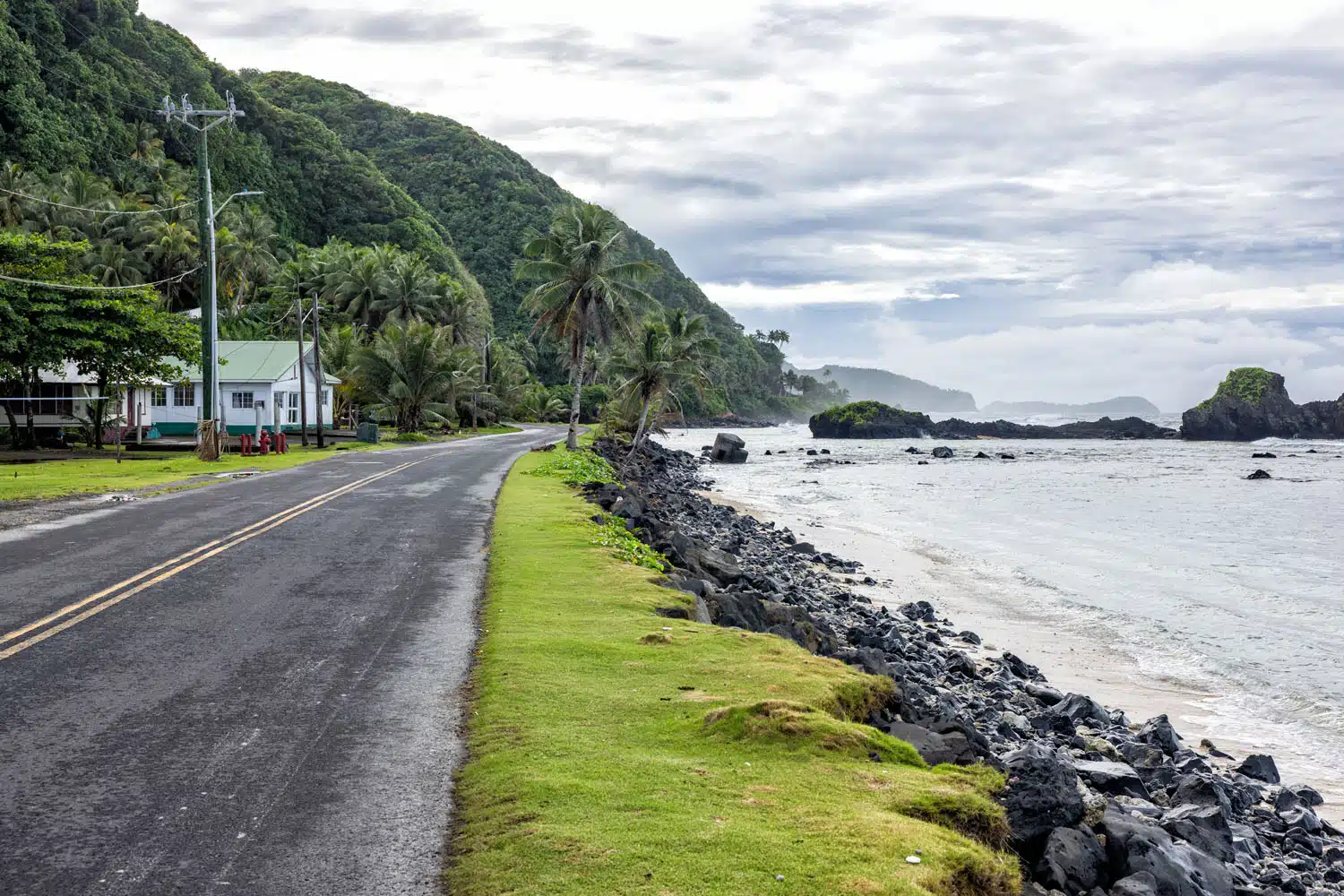
The road on the south coast of American Samoa
When to Visit American Samoa
American Samoa has a tropical climate. It is hot and humid all year.
The summer season (October through April) is the wet season and the time when tropical storms are more likely to occur. During these months, the average temperature is 86°F (30°C) with about 12 inches (30 cm) of rain per month. December tends to be the wettest month of the year.
The winter season (May through September) is the dry season. It is also slightly cooler this time of year. During these months, the average temperature is 84°F (29°C) with about 8 inches (20 cm) of rain per month. September tends to be the driest month of the year.
Our visit was in mid May. This is the transition month into the dry season. In Samoa, where we spent four days before visiting American Samoa, we had mostly sunny skies with a few rain showers. Once we got to American Samoa, it rained quite a bit. It rained for most of the day on two of the three days we spent here.
85°F may not sound hot, but factor in the high humidity and it feels like 100°F. American Samoa is located near the equator so the sun also feels quite warm on your skin.
The best time to visit American Samoa is during the winter season. Tropical storms in the summer can disrupt travel plans, not only in getting around American Samoa but also getting to and from here.
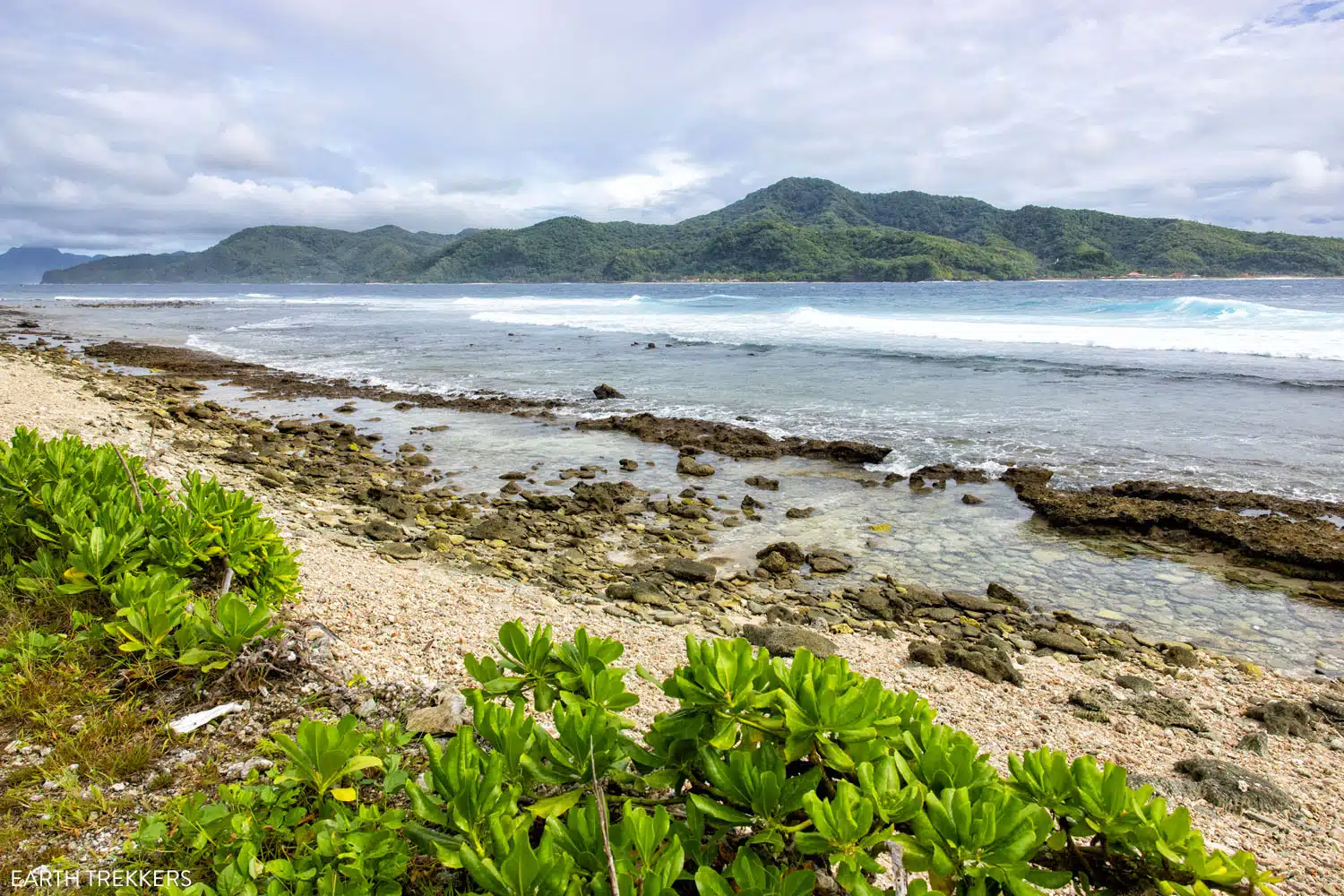
The view from Aunu’u Island
How Much Time Do You Need in American Samoa?
If you only plan to visit Tutuila, plan on spending 3 days on the island.
At the time that I am writing this, if you are flying from the USA, there are just 3 flights per week from Hawaii to American Samoa.
You can stay for a full week but I think you would run out of things to do in a few days. If you have that kind of time, it’s better to use some of that time to visit the Manu’a Islands or Samoa.
If you also plan to visit the Manu’a Islands, then plan to spend 10 days on American Samoa. With limited flights to and from American Samoa from other countries, plus a limited flight schedule to and from the Manu’a Islands, it takes a lot of time to include these islands.
You also have the option to add on Samoa, Fiji, or Hawaii to your trip, which I think is a great addition. We enjoyed our time in Samoa more than American Samoa and we think it is worthwhile if you have extra time in your itinerary. We have also visited Fiji in the past and it truly is a tropical paradise. Learn how to put this together in our Samoa and American Samoa Itinerary, which also has suggestions on how to include Fiji and Hawaii.
Our Three Day American Samoa Itinerary
Day 1 (Tuesday): In the morning, we flew from Samoa to American Samoa. We picked up our rental car, bought SIM cards at Bluesky, and checked into the Tradewinds Hotel. We spent the afternoon hiking several of the trails in the National Park of American Samoa. Dinner at Sadie’s By the Bay.
Day 2 (Wednesday): Drove to ‘Au’asi, visited Aunu’u Island, leisurely lunch at Tisa’s Barefoot Bar, and then saw the sights on the west side of the island.
Day 3 (Thursday): Tim and Tyler hiked the Mount ‘Alava Adventure Trail and I was their shuttle (it’s a point-to-point hike). Larsen Bay and Fagatele Bay in the afternoon. In the late afternoon, we checked out of the hotel, had dinner at the Flying Fox, returned the rental car, and took an 11:30 pm flight to Honolulu.
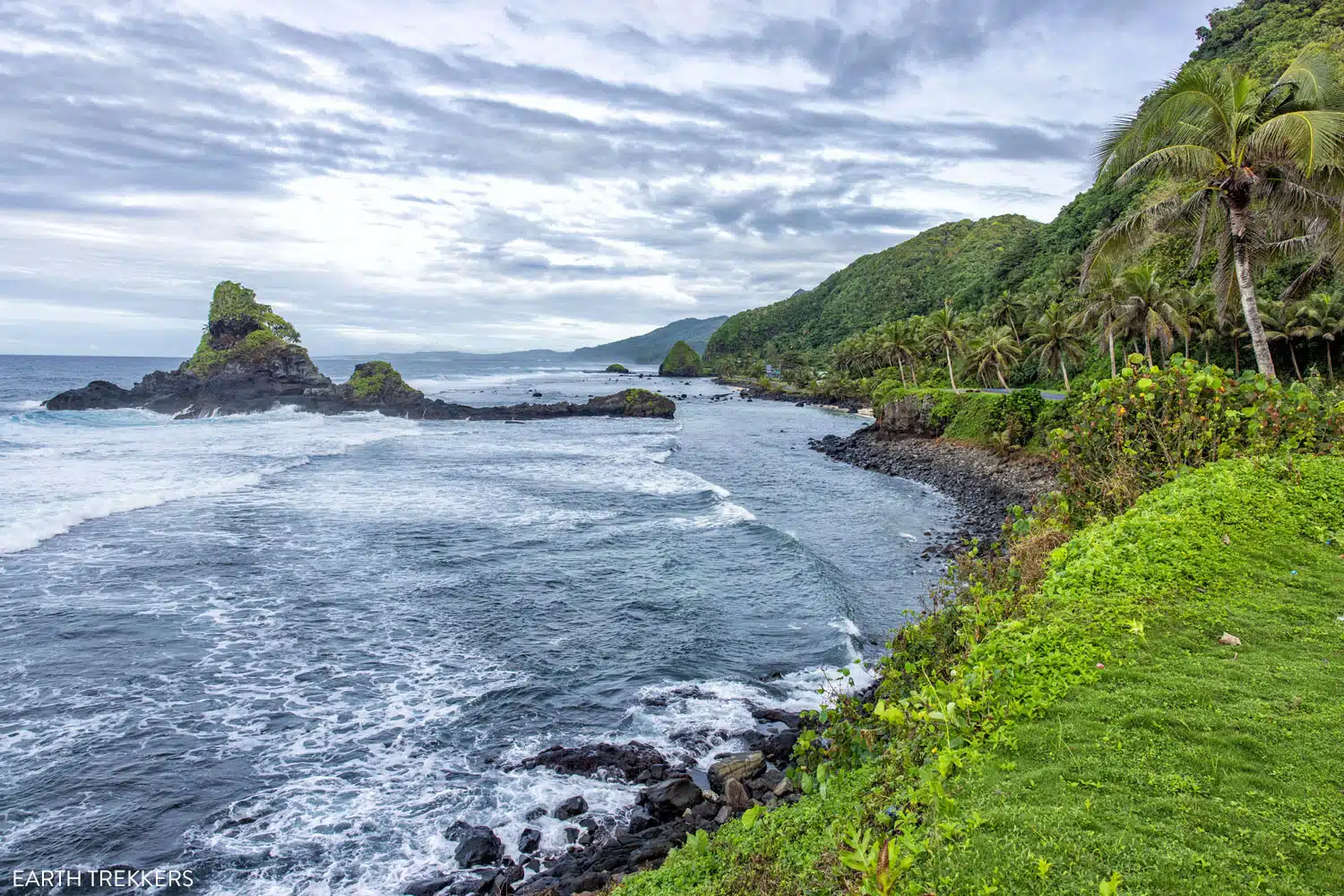
South Coast of American Samoa
Where to Stay in American Samoa
The best place to stay in Tutuila is the Tradewinds Hotel. This hotel looks great on the outside but could use a major update on the inside. Still, it is the best option on the island. Rooms range from standard rooms that can accommodate up to two people to very spacious suites. There is an outdoor pool and onsite restaurant. Tyler got breakfast once in the restaurant and said that the only thing they were serving was stale bread, so we went elsewhere for food after this.
On Tutuila, other places to consider are Sadie’s by the Sea, the Sadie Thompson Inn, and the Pago Airport Inn, but they all get mediocre to poor reviews so your best bet is the Tradewinds Hotel.
Where to Eat
The best place to eat is Tisa’s Barefoot Bar. The food and the setting are the best on Tutuila.
Our next favorite spot is Sadie’s By the Bay, in Pago Pago. This upscale restaurant serves a wide variety of foods and is sure to satisfy everyone in your group.
We had a nice dinner at the Flying Fox Gastropub. This small bar and restaurant is decorated with neon lights and posters of celebrities and singers. It’s a good spot to get a burger and a cocktail.
If you have any questions about the best things to do in American Samoa, let us know in the comment section below.
More Information for Your Trip to American Samoa
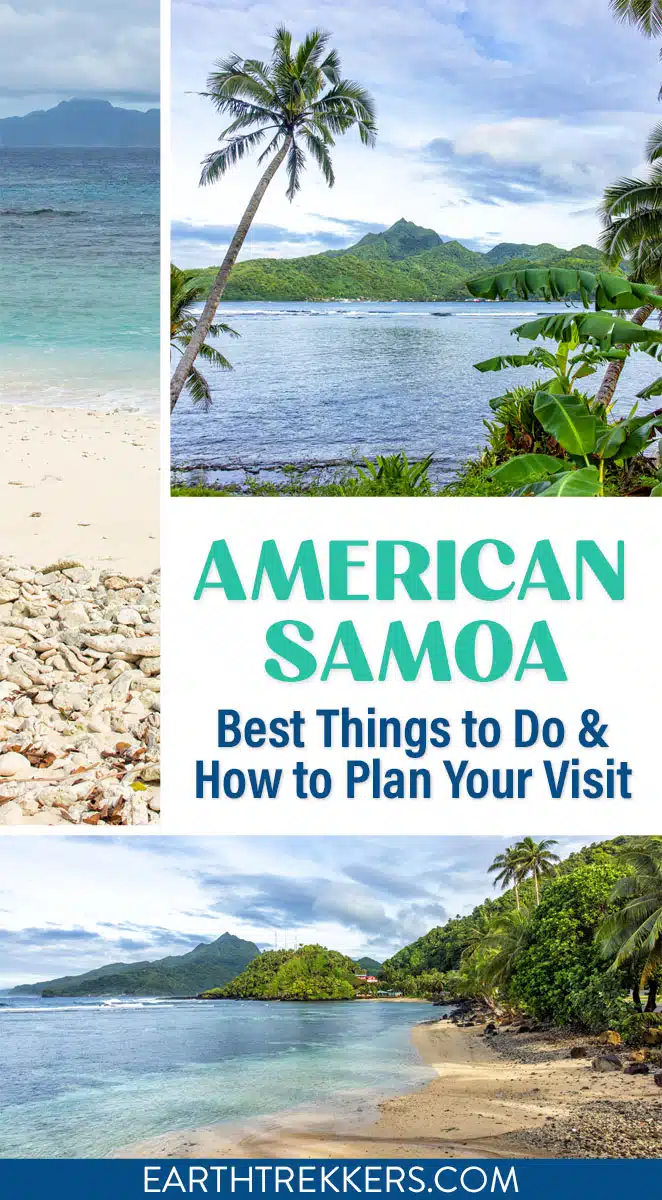
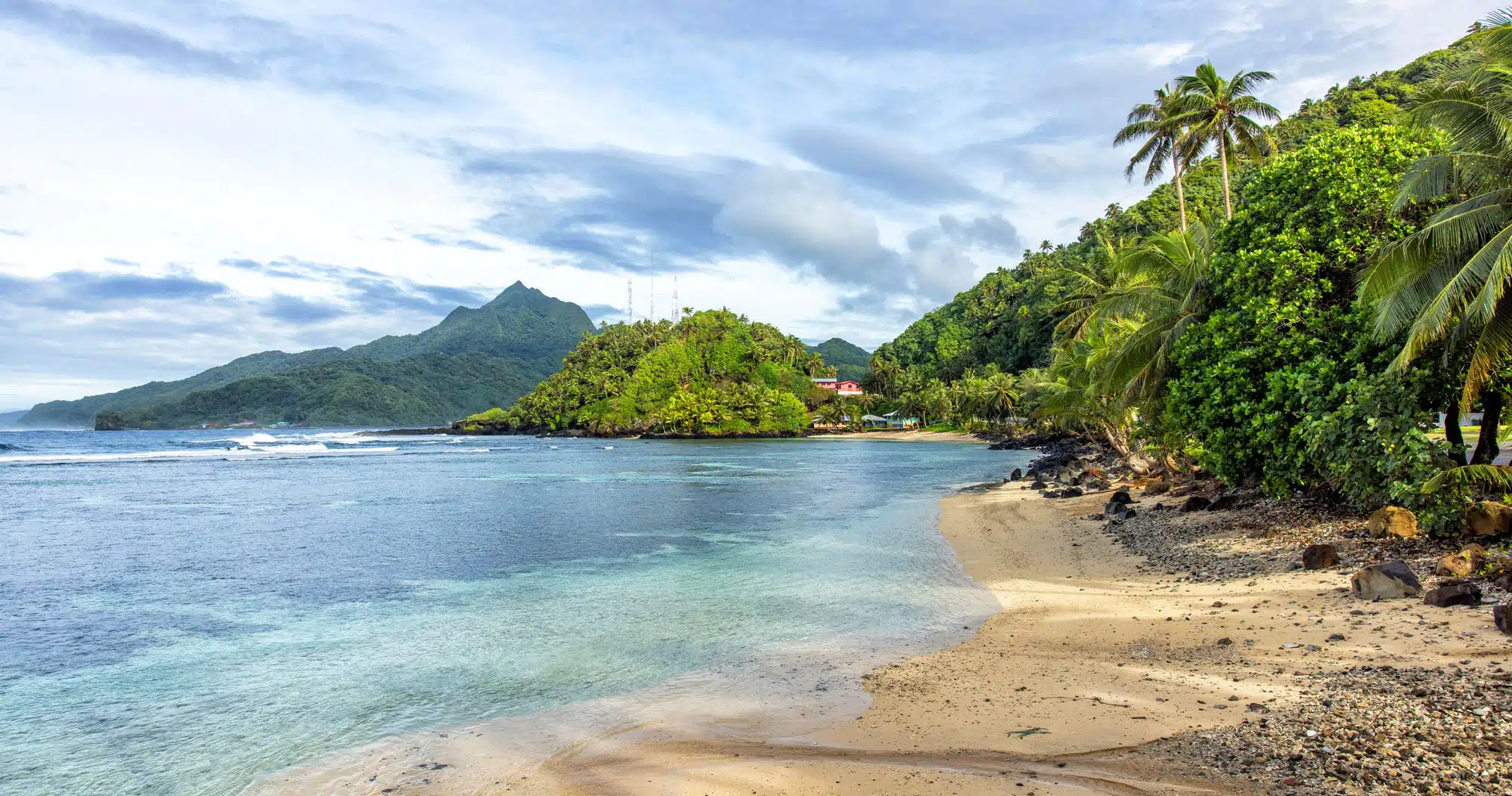
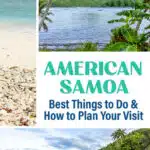
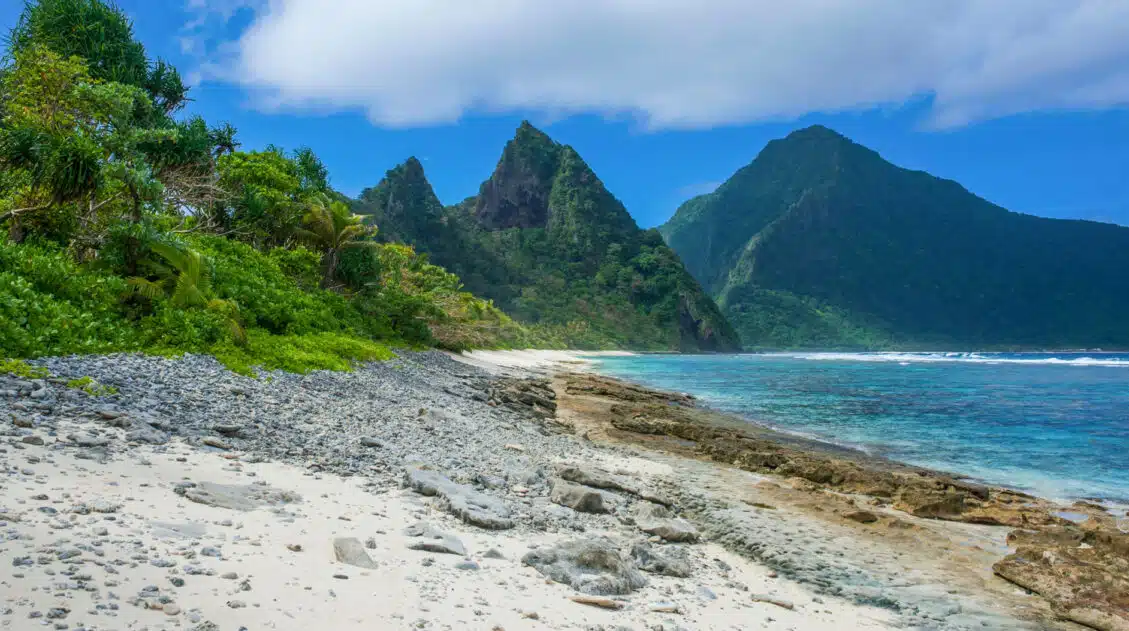
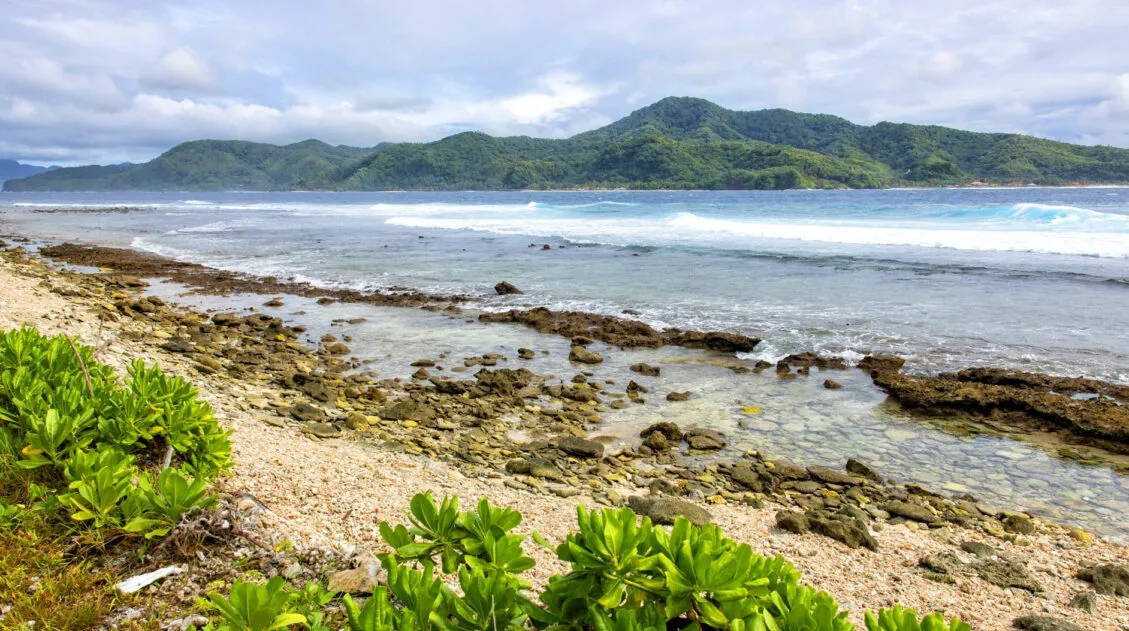
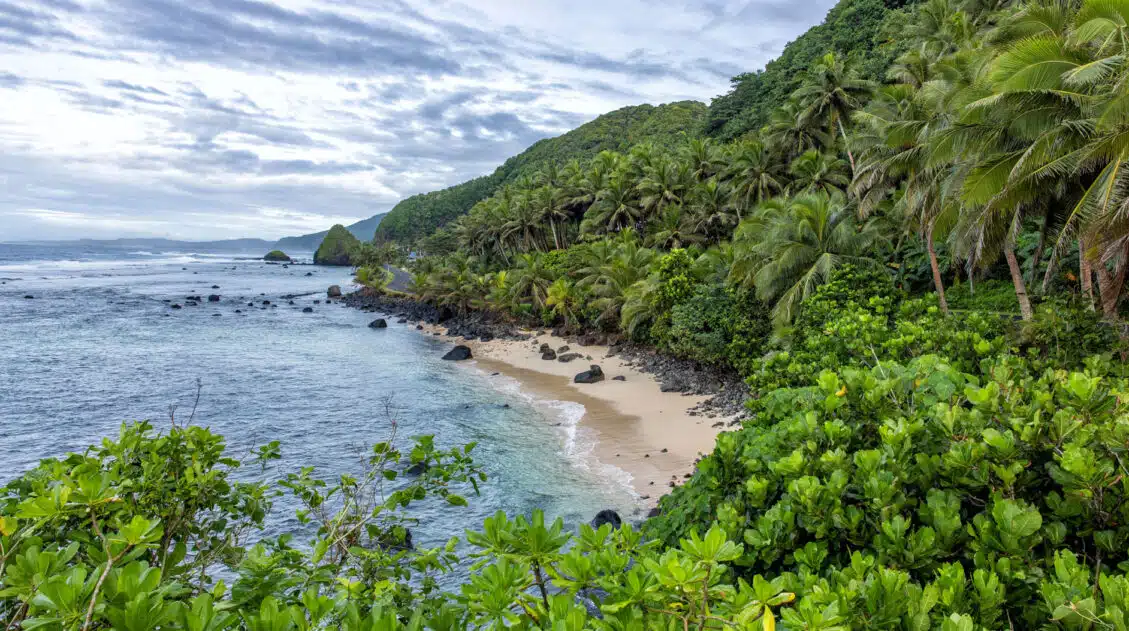
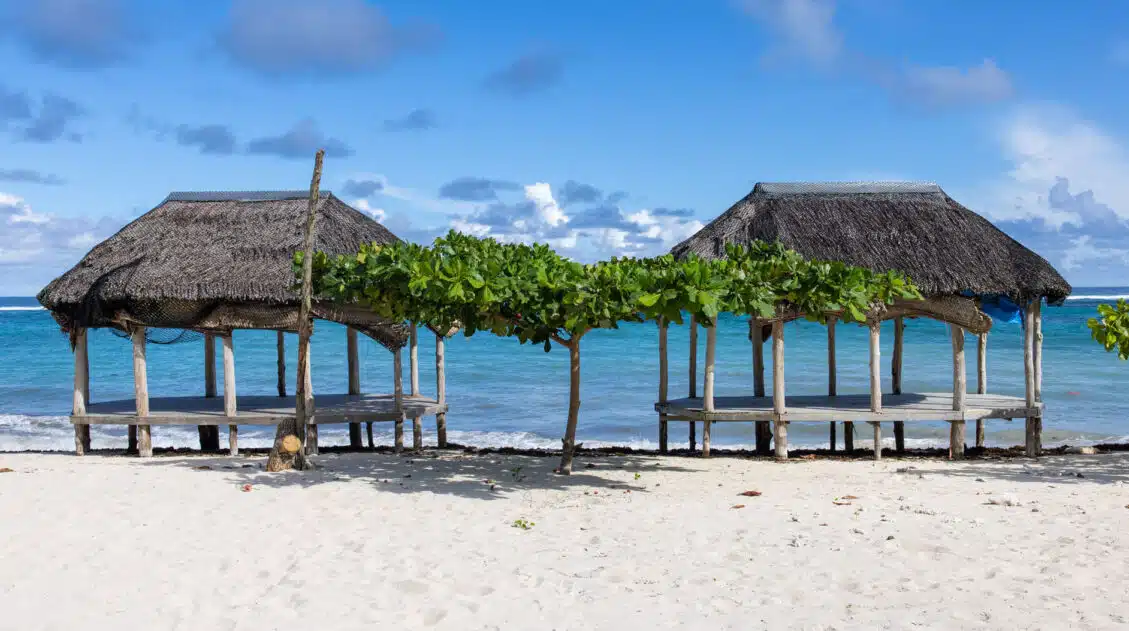
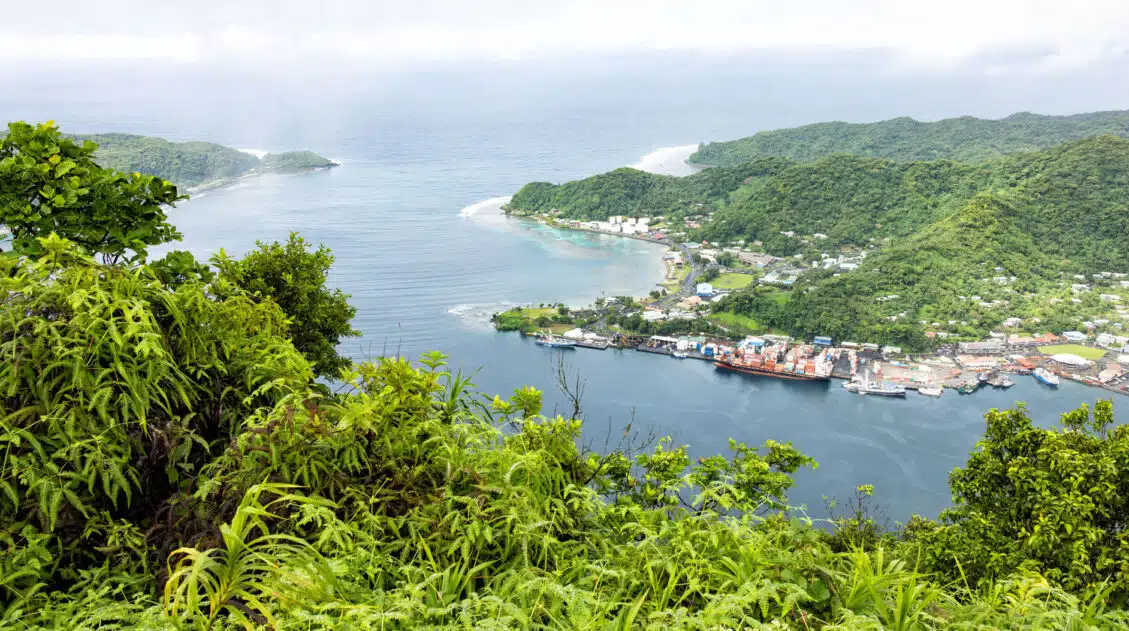
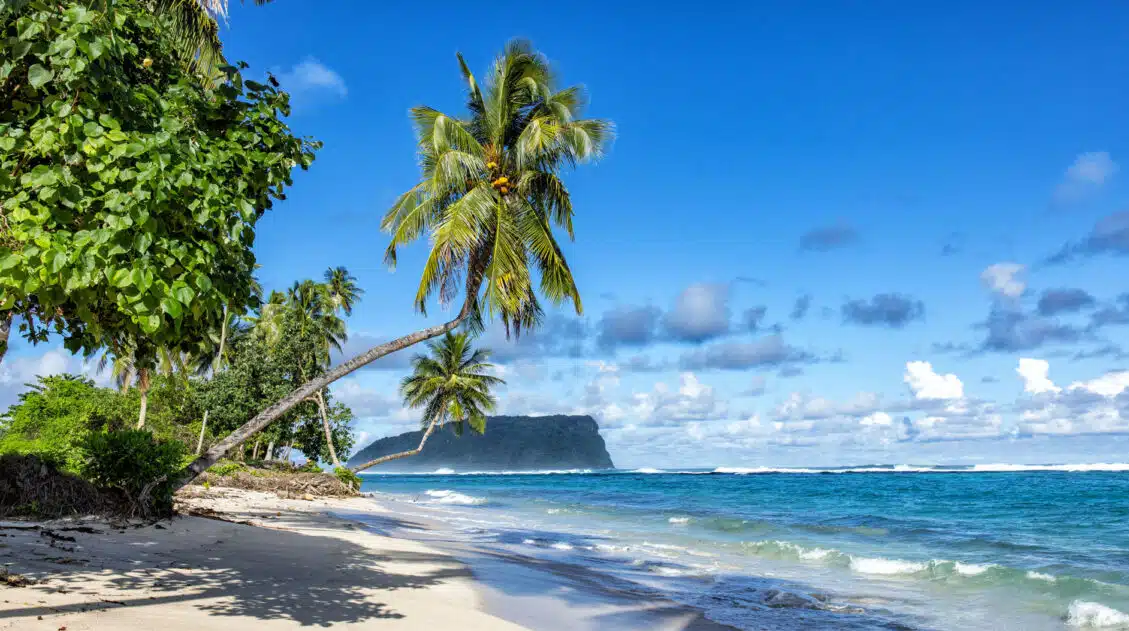
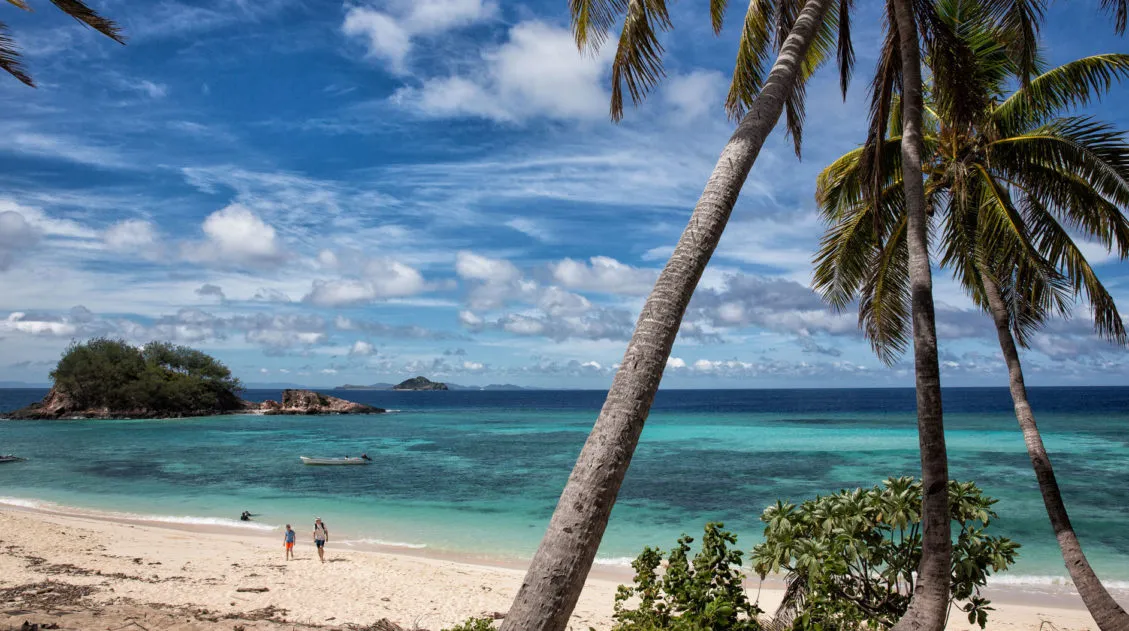
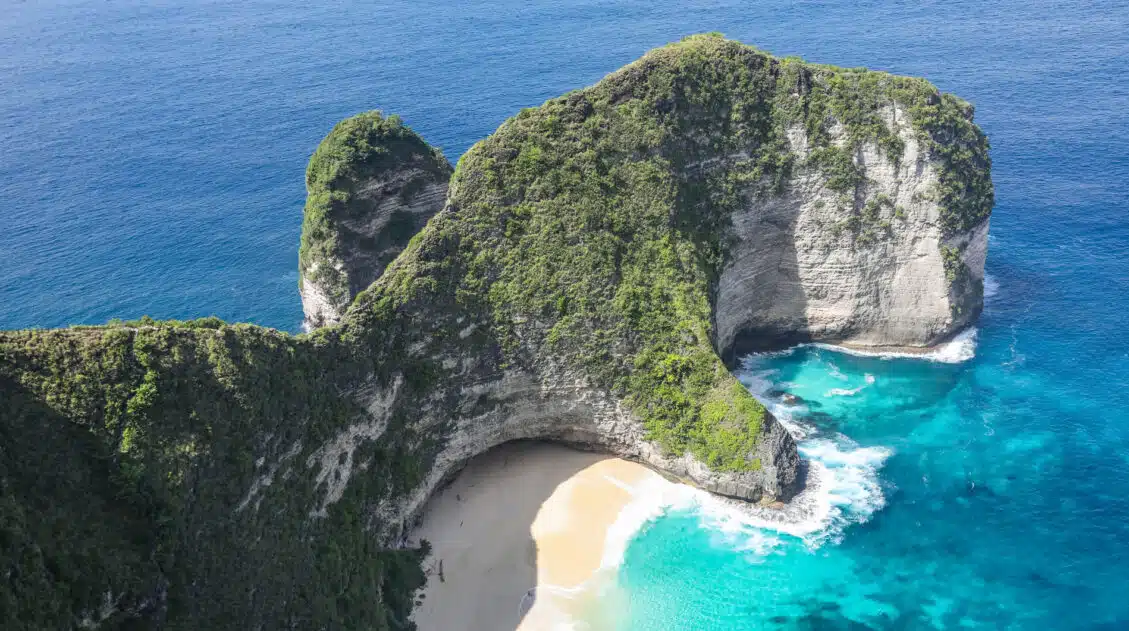
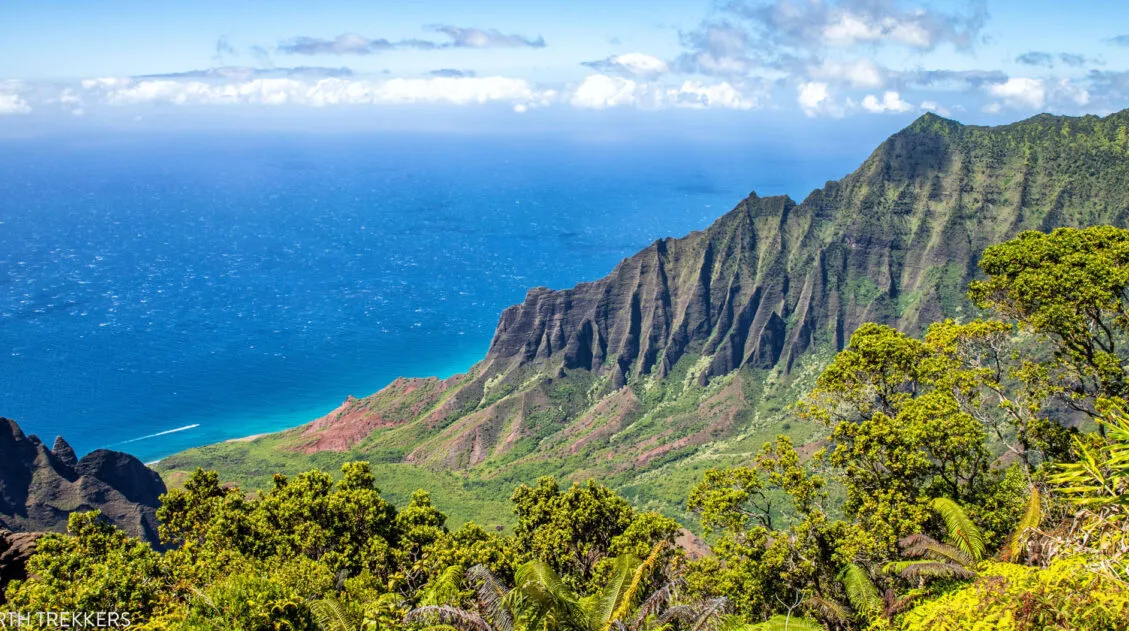
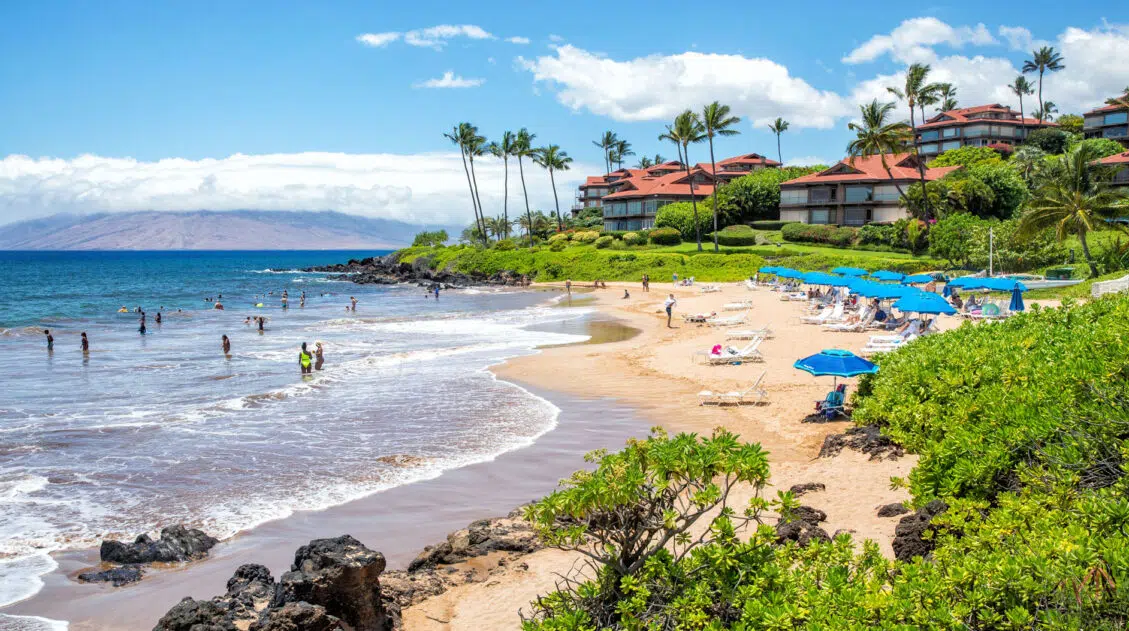
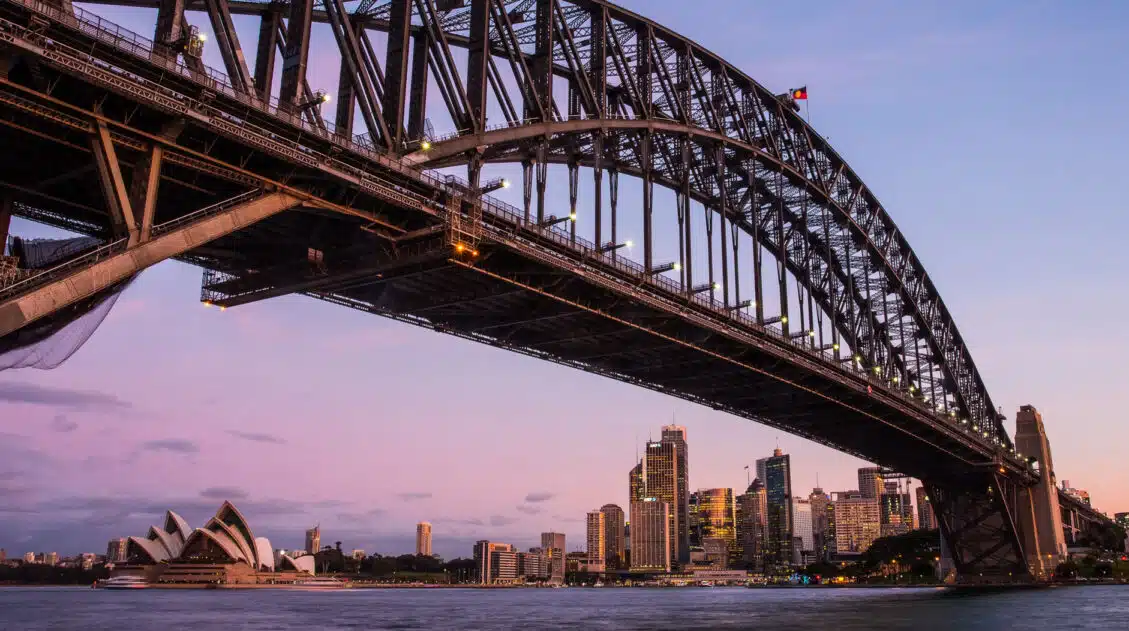
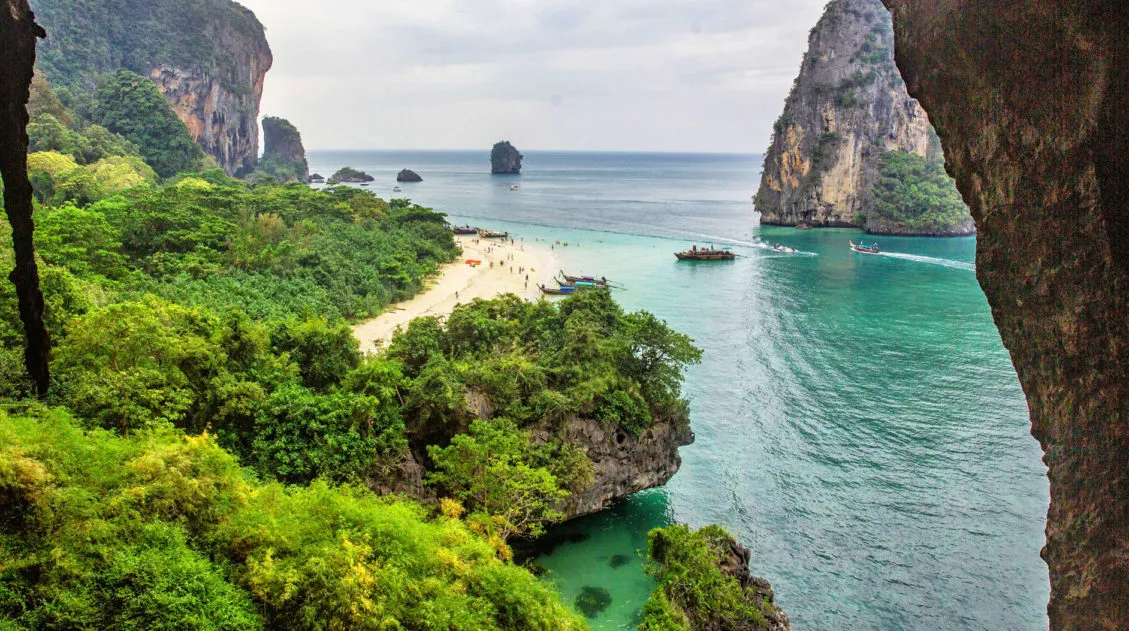
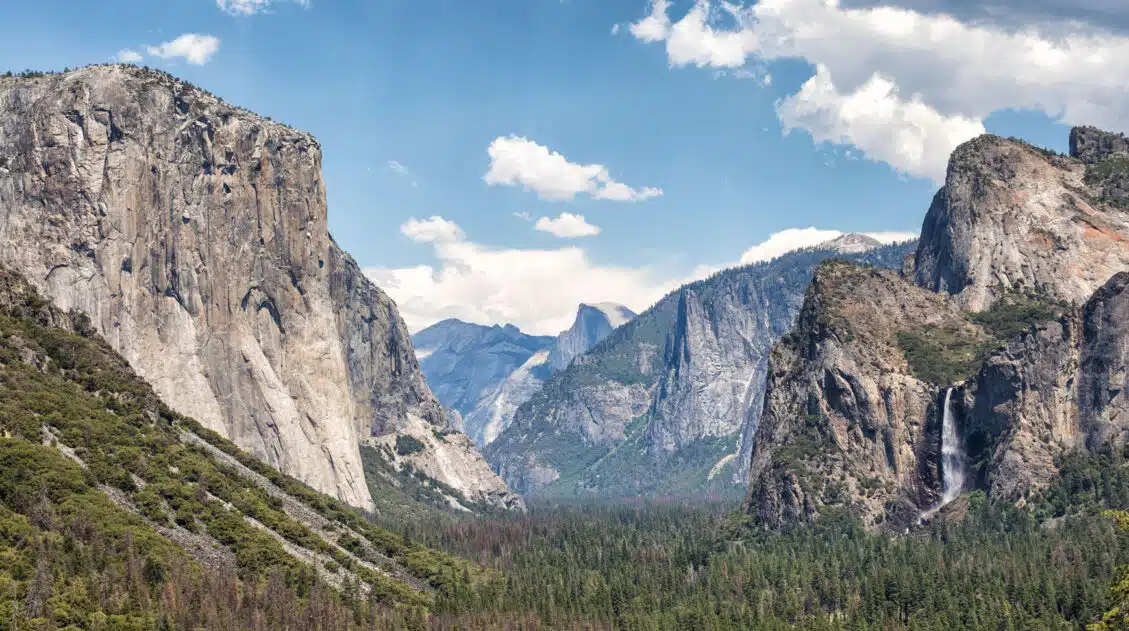
Comments 9